Shows
 راه کار سبزاثر فستینگ (روزه ی مداوم) روی مغزتوی این قسمت از راه کار سبز درمورد اثر فستیگ روی مغز صحبت میکنیم. drmahshadk@lunaty_health@:SourcesJohn O’Leary, Chloé Georgeaux-Healy, Lucy Serpell, The impact of continuous calorie restriction and fasting on cognition in adults without eating disorders, Nutrition Reviews, Volume 83, Issue 1, January 2025, Pages 146–159, https://doi.org/10.1093/nutrit/nuad170Kapogiannis D, Manolopoulos A, Mullins R, Avgerinos K, Delgado-Peraza F, Mustapic M, Nogueras-Ortiz C, Yao PJ, Pucha KA, Brooks J, Chen Q, Haas SS, Ge R, Hartnell LM, Cookson MR, Egan JM, Frangou S, Mattson MP. Brain responses to intermittent fasting and the healthy living diet in older adults. Cell Metab. 2024 Aug 6...2025-02-0930 min
راه کار سبزاثر فستینگ (روزه ی مداوم) روی مغزتوی این قسمت از راه کار سبز درمورد اثر فستیگ روی مغز صحبت میکنیم. drmahshadk@lunaty_health@:SourcesJohn O’Leary, Chloé Georgeaux-Healy, Lucy Serpell, The impact of continuous calorie restriction and fasting on cognition in adults without eating disorders, Nutrition Reviews, Volume 83, Issue 1, January 2025, Pages 146–159, https://doi.org/10.1093/nutrit/nuad170Kapogiannis D, Manolopoulos A, Mullins R, Avgerinos K, Delgado-Peraza F, Mustapic M, Nogueras-Ortiz C, Yao PJ, Pucha KA, Brooks J, Chen Q, Haas SS, Ge R, Hartnell LM, Cookson MR, Egan JM, Frangou S, Mattson MP. Brain responses to intermittent fasting and the healthy living diet in older adults. Cell Metab. 2024 Aug 6...2025-02-0930 min راه کار سبزنقش مهم آب در سلامت مغز و مه مغزیتوی این قسمت از راه کار سبز ما یاد میگیریم که آب چه نقش مهمی در سلامت مغز و بدن داره و تشنگی چه جوری می تونه ایجاد مه مغزی کنه Instagram: @drmahshadk@lunaty_health Sources: Int J Environ Res Public Health. 2019 May 29;16(11):1891. doi: 10.3390/ijerph16111891Effects of Dehydration and Rehydration on Cognitive Performance and Mood among Male College Students in Cangzhou, China: A Self-Controlled TrialJ Neurosci. 2021 Sep 15;41(37):7698–7711. doi: 10.1523/JNEUROSCI.0619-21.2021The Glymphatic System: A Novel Component of Fundamental Neurobiologyhttps://link.springer.com/article/10.1023/A:10103469045262025-02-0926 min
راه کار سبزنقش مهم آب در سلامت مغز و مه مغزیتوی این قسمت از راه کار سبز ما یاد میگیریم که آب چه نقش مهمی در سلامت مغز و بدن داره و تشنگی چه جوری می تونه ایجاد مه مغزی کنه Instagram: @drmahshadk@lunaty_health Sources: Int J Environ Res Public Health. 2019 May 29;16(11):1891. doi: 10.3390/ijerph16111891Effects of Dehydration and Rehydration on Cognitive Performance and Mood among Male College Students in Cangzhou, China: A Self-Controlled TrialJ Neurosci. 2021 Sep 15;41(37):7698–7711. doi: 10.1523/JNEUROSCI.0619-21.2021The Glymphatic System: A Novel Component of Fundamental Neurobiologyhttps://link.springer.com/article/10.1023/A:10103469045262025-02-0926 min راه کار سبزتوصیه های علمی برای مدیریت علائم بیش فعالیدرمان بیش فعالی با غذا؟
Sources (PMID):
21309695
34836314
25364604
33539192
27555775
26740931
25908900
2024-11-2042 min
راه کار سبزتوصیه های علمی برای مدیریت علائم بیش فعالیدرمان بیش فعالی با غذا؟
Sources (PMID):
21309695
34836314
25364604
33539192
27555775
26740931
25908900
2024-11-2042 min راه کار سبزدر مغز بیش فعال چه می گذرد- ADHD
Instagram:
@drmahshadk
@lunaty_health
Sources (PMID)
2531736
20861593
37081447
2024-11-1428 min
راه کار سبزدر مغز بیش فعال چه می گذرد- ADHD
Instagram:
@drmahshadk
@lunaty_health
Sources (PMID)
2531736
20861593
37081447
2024-11-1428 min راه کار سبزچه جوری ورزش جلوگیری می کنه از الزایمرچه جوری ورزش جلوگیری می کنه از الزایمر
2024-11-0618 min
راه کار سبزچه جوری ورزش جلوگیری می کنه از الزایمرچه جوری ورزش جلوگیری می کنه از الزایمر
2024-11-0618 min راه کار سبزالزایمر و نقش بزرگ باکتریای رودهالزایمر و نقش بزرگ باکتریای روده2024-10-2332 min
راه کار سبزالزایمر و نقش بزرگ باکتریای رودهالزایمر و نقش بزرگ باکتریای روده2024-10-2332 min راه کار سبزالزایمر یک نوع دیابت است؟الزایمر یک نوع دیابت است؟2024-10-1627 min
راه کار سبزالزایمر یک نوع دیابت است؟الزایمر یک نوع دیابت است؟2024-10-1627 min راه کار سبزیائسگی و خطر مقاومت انسولین و دیابتیائسگی و خطر مقاومت انسولین و دیابت2024-10-0927 min
راه کار سبزیائسگی و خطر مقاومت انسولین و دیابتیائسگی و خطر مقاومت انسولین و دیابت2024-10-0927 min راه کار سبزچرا وزن و چربی در دوران یائسگی بیشتر میشه؟
چرا وزن و چربی در دوران یائسگی بیشتر میشه؟
2024-10-0228 min
راه کار سبزچرا وزن و چربی در دوران یائسگی بیشتر میشه؟
چرا وزن و چربی در دوران یائسگی بیشتر میشه؟
2024-10-0228 min راه کار سبزبیشتر از 10 راه کار برای بهبود خواب در دوران یائسگی بیشتر از 10 راه کار برای بهبود خواب در دوران یائسگی2024-09-2518 min
راه کار سبزبیشتر از 10 راه کار برای بهبود خواب در دوران یائسگی بیشتر از 10 راه کار برای بهبود خواب در دوران یائسگی2024-09-2518 min راه کار سبزچه جوری هوشمون و بالا ببریم
چه جوری هوشمون و بالا ببریم
2024-09-0417 min
راه کار سبزچه جوری هوشمون و بالا ببریم
چه جوری هوشمون و بالا ببریم
2024-09-0417 min راه کار سبزاثر منوپاز روی مغز وخطر الزایمر
اثر منوپاز روی مغز وخطر الزایمر
2024-08-2830 min
راه کار سبزاثر منوپاز روی مغز وخطر الزایمر
اثر منوپاز روی مغز وخطر الزایمر
2024-08-2830 min راه کار سبزاثر منوپاز روی تمامی سیستم های بدناثر منوپاز روی تمامی سیستم های بدن2024-08-2116 min
راه کار سبزاثر منوپاز روی تمامی سیستم های بدناثر منوپاز روی تمامی سیستم های بدن2024-08-2116 min راه کار سبزاثر اومگا سه روی مغز،تمرکز، قلب و کبد چربدر این قسمت، دکتر مهشاد کلاهدوزان، دکترای علوم اعصاب، و مریم قادریان، متخصص تغذیه ثبتشده، توضیح میدهند که چگونه امگا-۳ به عملکرد بدن کمک میکند. آنها توضیح میدهند که امگا-۳ چگونه عمل میکند، چه نوع امگا-۳ مؤثرتر است، و چگونه این مولکولهای امگا-۳ میتوانند به عملکرد بهتر مغز، سیستم قلبیعروقی و کبد کمک کنند.
Resources:
1. The Importance of Maintaining a Low Omega-6/Omega-3 Ratio for Reducing the Risk of Autoimmune Diseases, Asthma, and Allergies
Effects of Omega-3 Polyunsaturated Fatty Acids on Brain Functions: A Systematic Review
Can adults adequately convert alpha-linolenic acid (18:3n-3) to eicosapentaenoic acid (20:5n-3) and docosahexaenoic acid (22:6n-3)?
Critical appraisal of omega-3 fatty acids in attention-deficit/hyperactivity disorder treatment
Omega-3 Fatty Acids and Nonalcoholic Fatty Liver Disease in Adults and Children: Where Do We Stand?
Omega-3 Fatty Acids and Insulin Resistance: Focus on the Regulation of Mitochondria and Endoplasmic Reticulum Stress
2024-08-1415 min
راه کار سبزاثر اومگا سه روی مغز،تمرکز، قلب و کبد چربدر این قسمت، دکتر مهشاد کلاهدوزان، دکترای علوم اعصاب، و مریم قادریان، متخصص تغذیه ثبتشده، توضیح میدهند که چگونه امگا-۳ به عملکرد بدن کمک میکند. آنها توضیح میدهند که امگا-۳ چگونه عمل میکند، چه نوع امگا-۳ مؤثرتر است، و چگونه این مولکولهای امگا-۳ میتوانند به عملکرد بهتر مغز، سیستم قلبیعروقی و کبد کمک کنند.
Resources:
1. The Importance of Maintaining a Low Omega-6/Omega-3 Ratio for Reducing the Risk of Autoimmune Diseases, Asthma, and Allergies
Effects of Omega-3 Polyunsaturated Fatty Acids on Brain Functions: A Systematic Review
Can adults adequately convert alpha-linolenic acid (18:3n-3) to eicosapentaenoic acid (20:5n-3) and docosahexaenoic acid (22:6n-3)?
Critical appraisal of omega-3 fatty acids in attention-deficit/hyperactivity disorder treatment
Omega-3 Fatty Acids and Nonalcoholic Fatty Liver Disease in Adults and Children: Where Do We Stand?
Omega-3 Fatty Acids and Insulin Resistance: Focus on the Regulation of Mitochondria and Endoplasmic Reticulum Stress
2024-08-1415 min راه کار سبز...اثر قهوه روی اضطراب شدید، الزایمر، پارکینسون، ودکتر مهشاد کلاهدوزان و مریم قادریان تحقیقات روز در ارتباط با اثر قهوه روی اضطراب شدید، حملات پنیک، الزایمر، پارکینسون، تیرویید، پوکی استخوان را به اشتراک می گذارند.
Our Instagram:
@drmahshadk
@lunaty_health
Resources:
The neuroprotective
effects of caffeine in neurodegenerative diseases: https://www.ncbi.nlm.nih.gov/pmc/articles/PMC6492672/
Effects of caffeine
on anxiety and panic attacks in patients with panic disorder: A systematic
review and meta-analysis: https://www.sciencedirect.com/science/article/pii/S0163834321001614?via%3Dihub
Association between
caffeine intake and lumbar spine bone mineral density in adults aged 20–49: A
cross-sectional study
https://www.frontiersin.org/journals/endocrinology/articles/10.3389/fendo.2022.1008275/full
Relationship
between caffeine intake and thyroid function: results from NHANES 2007–2012
https://www.ncbi.nlm.nih.gov/pmc/articles/PMC10369722/
2024-08-0715 min
راه کار سبز...اثر قهوه روی اضطراب شدید، الزایمر، پارکینسون، ودکتر مهشاد کلاهدوزان و مریم قادریان تحقیقات روز در ارتباط با اثر قهوه روی اضطراب شدید، حملات پنیک، الزایمر، پارکینسون، تیرویید، پوکی استخوان را به اشتراک می گذارند.
Our Instagram:
@drmahshadk
@lunaty_health
Resources:
The neuroprotective
effects of caffeine in neurodegenerative diseases: https://www.ncbi.nlm.nih.gov/pmc/articles/PMC6492672/
Effects of caffeine
on anxiety and panic attacks in patients with panic disorder: A systematic
review and meta-analysis: https://www.sciencedirect.com/science/article/pii/S0163834321001614?via%3Dihub
Association between
caffeine intake and lumbar spine bone mineral density in adults aged 20–49: A
cross-sectional study
https://www.frontiersin.org/journals/endocrinology/articles/10.3389/fendo.2022.1008275/full
Relationship
between caffeine intake and thyroid function: results from NHANES 2007–2012
https://www.ncbi.nlm.nih.gov/pmc/articles/PMC10369722/
2024-08-0715 min راه کار سبزهمه چیز درباره عمل کرد کافئیندر این قسمت، مهشاد و مریم درباره نحوه عملکرد کافئین، بهترین زمان برای نوشیدن قهوه، تأثیر قهوه بر خواب، چرا قهوه گاهی باعث خوابآلودگی میشود، تأثیر قهوه بر سطح انسولین و مسائل دیگر صحبت میکنند.
2024-07-3128 min
راه کار سبزهمه چیز درباره عمل کرد کافئیندر این قسمت، مهشاد و مریم درباره نحوه عملکرد کافئین، بهترین زمان برای نوشیدن قهوه، تأثیر قهوه بر خواب، چرا قهوه گاهی باعث خوابآلودگی میشود، تأثیر قهوه بر سطح انسولین و مسائل دیگر صحبت میکنند.
2024-07-3128 min راه کار سبزمعرفی راهکاردر این قسمت، مهشاد و مریم خودشان را معرفی میکنند و در مورد تحصیلات، حرفه و تخصصشان توضیح میدهند. همچنین، اشتیاق و هدفشان از این پادکست را به اشتراک میگذارند.2024-07-3115 min
راه کار سبزمعرفی راهکاردر این قسمت، مهشاد و مریم خودشان را معرفی میکنند و در مورد تحصیلات، حرفه و تخصصشان توضیح میدهند. همچنین، اشتیاق و هدفشان از این پادکست را به اشتراک میگذارند.2024-07-3115 min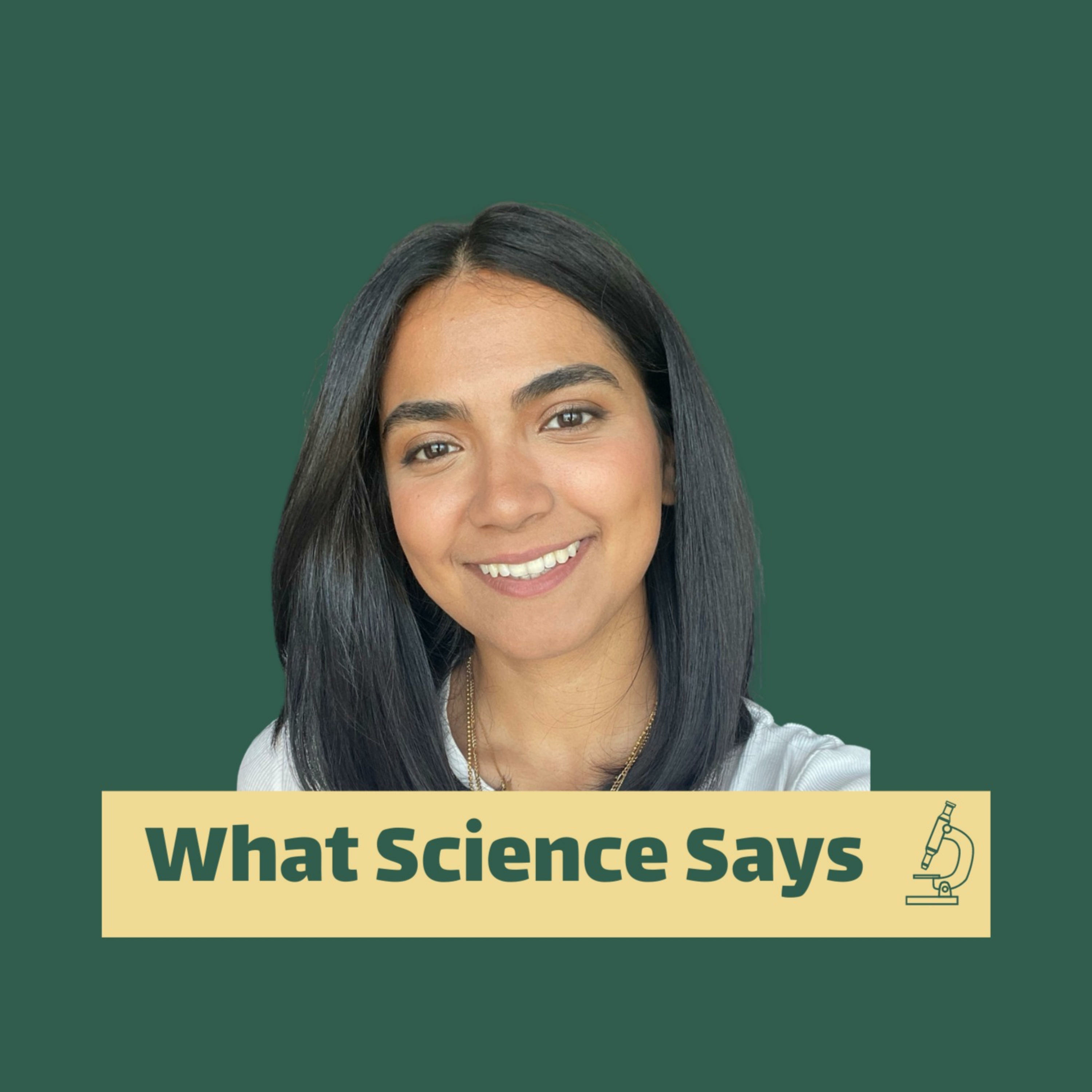 What Science Says23. Unlocking the Brain's Potential: Alertness, Motivation, and Memory MasteryIn today's episode, we learn the conditions we need to meet for our brain to undergo neuroplasticity in adulthood. We learn easy and neuroscience-proven skills that we can incorporate in our day to day to set ourselves up for success for learning and aging.
neuroplasticity, learning, memory, neuroscience, aging, lifestyle
2023-11-1615 min
What Science Says23. Unlocking the Brain's Potential: Alertness, Motivation, and Memory MasteryIn today's episode, we learn the conditions we need to meet for our brain to undergo neuroplasticity in adulthood. We learn easy and neuroscience-proven skills that we can incorporate in our day to day to set ourselves up for success for learning and aging.
neuroplasticity, learning, memory, neuroscience, aging, lifestyle
2023-11-1615 min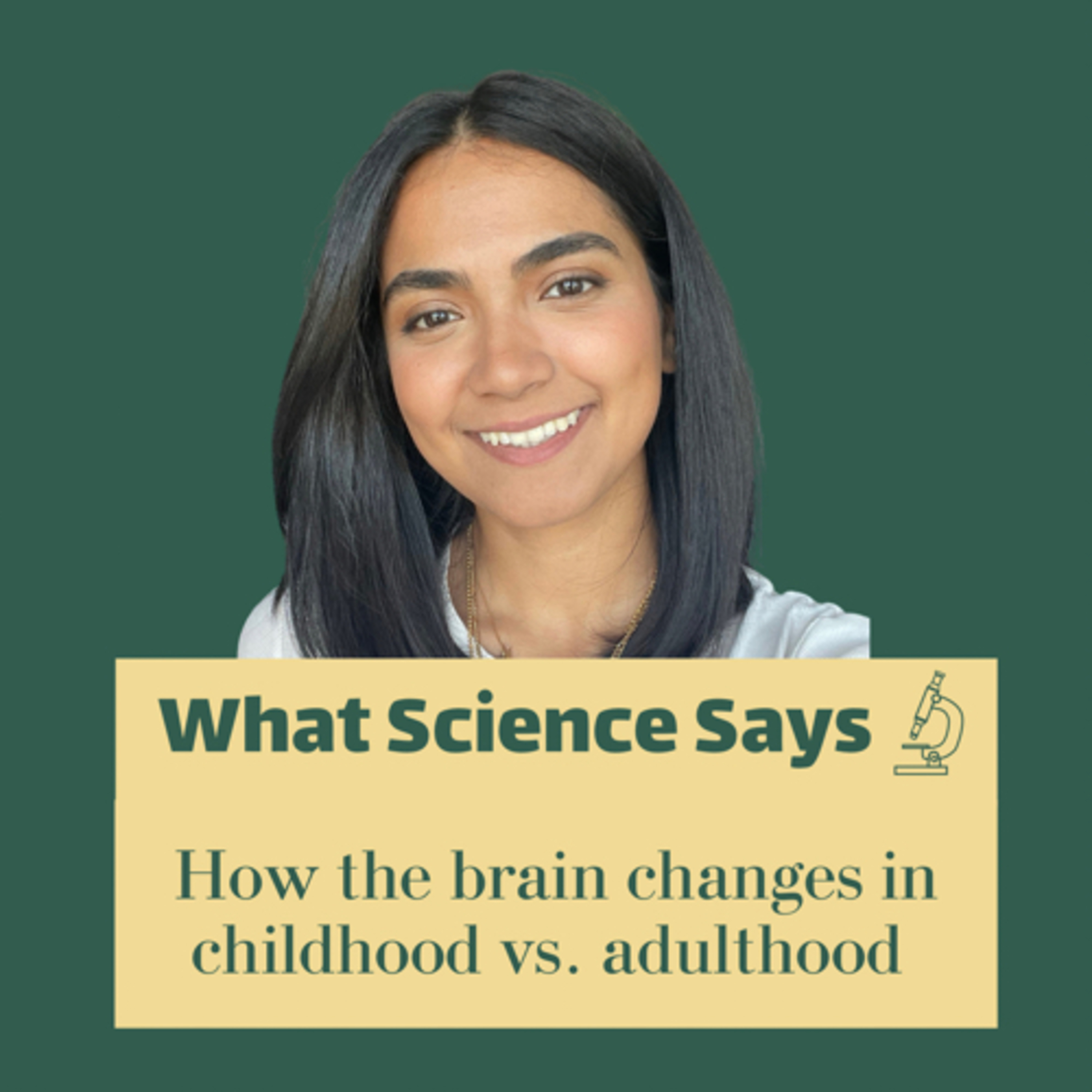 What Science Says22. Basics of Neuroplasticity - Childhood vs AdulthoodIn this episode, Mahshad goes over the history and basics of neuroplasticity. We learn about the two different types of neuroplasticity and lay the foundation for future episodes on how to access neuroplasticity in adulthood.2023-11-0215 min
What Science Says22. Basics of Neuroplasticity - Childhood vs AdulthoodIn this episode, Mahshad goes over the history and basics of neuroplasticity. We learn about the two different types of neuroplasticity and lay the foundation for future episodes on how to access neuroplasticity in adulthood.2023-11-0215 min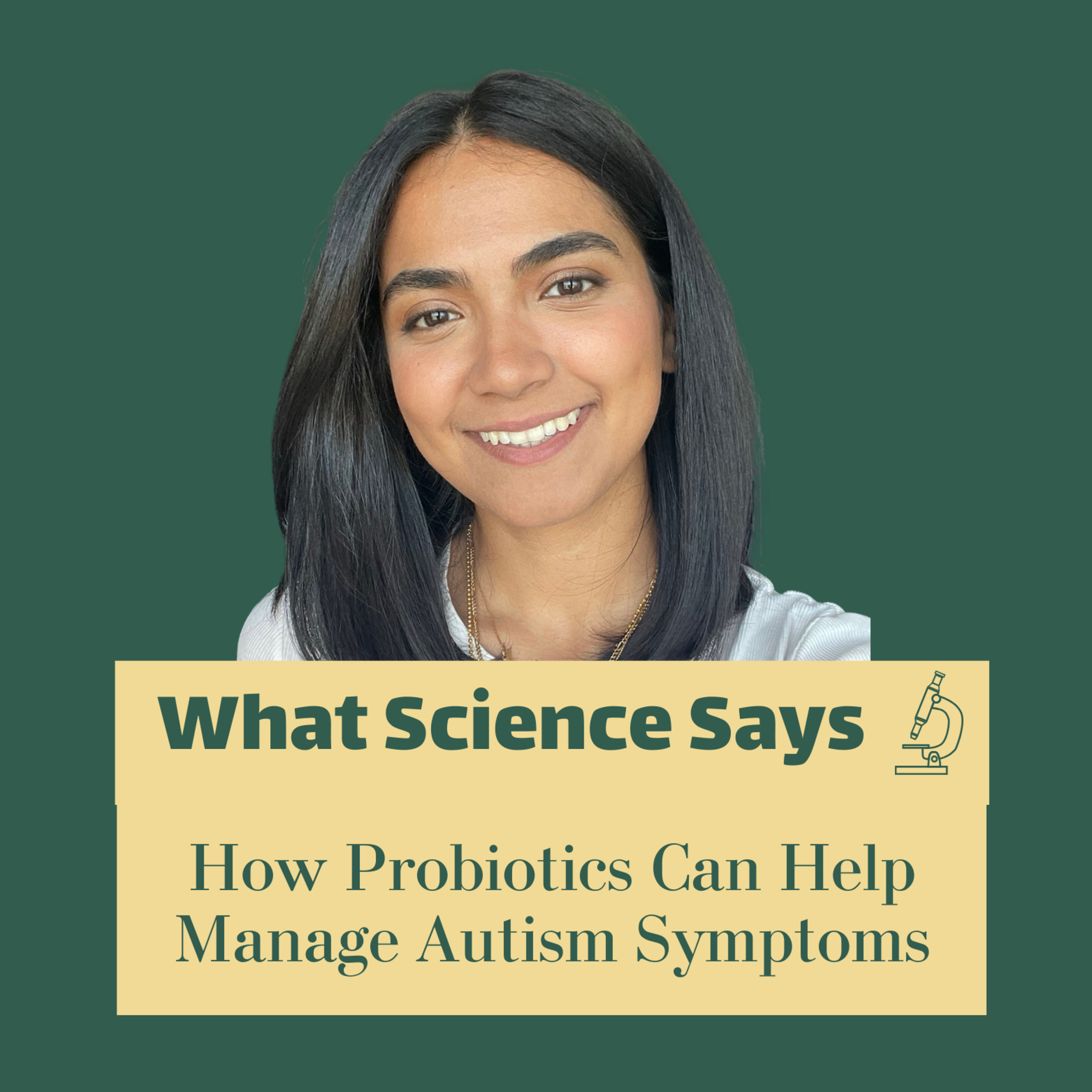 What Science Says21. How Probiotics Can Help Manage Autism SymptomsIn this episode of the What Science Says Podcast, we learn about how probiotics can help manage the symptoms of autism by helping manage gastrointestinal symptoms and potentially changing brain activity patterns.
2023-09-1308 min
What Science Says21. How Probiotics Can Help Manage Autism SymptomsIn this episode of the What Science Says Podcast, we learn about how probiotics can help manage the symptoms of autism by helping manage gastrointestinal symptoms and potentially changing brain activity patterns.
2023-09-1308 min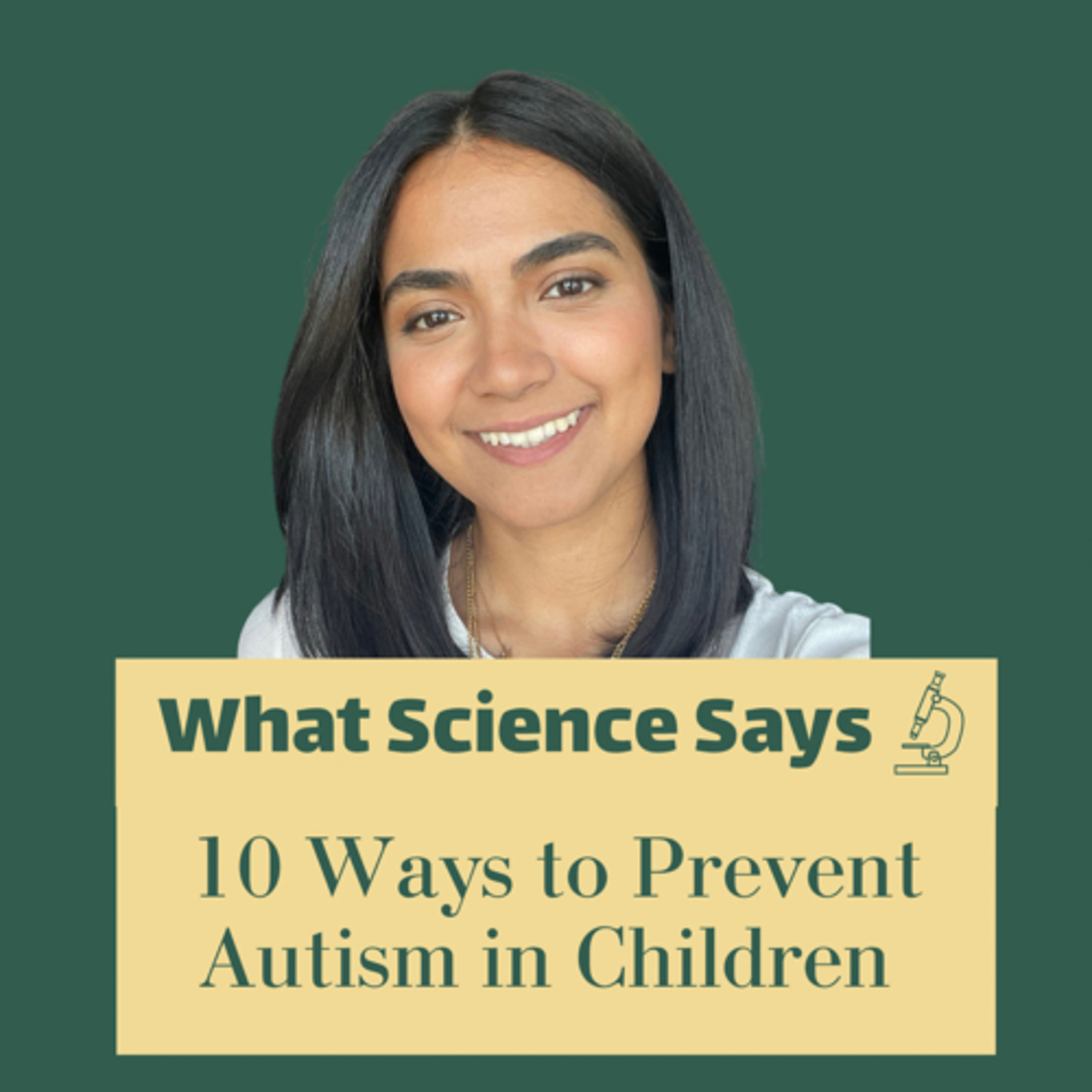 What Science Says20. Ten (10) Ways to Prevent Autism in ChildrenIn this episode, we are going to talk about the critical time periods that gut dysbiosis that increase the development of autism. We will end with 10 ways to take care gut microbiome of the child both in and out of the womb, to help reduce the risk of autism development.2023-09-0609 min
What Science Says20. Ten (10) Ways to Prevent Autism in ChildrenIn this episode, we are going to talk about the critical time periods that gut dysbiosis that increase the development of autism. We will end with 10 ways to take care gut microbiome of the child both in and out of the womb, to help reduce the risk of autism development.2023-09-0609 min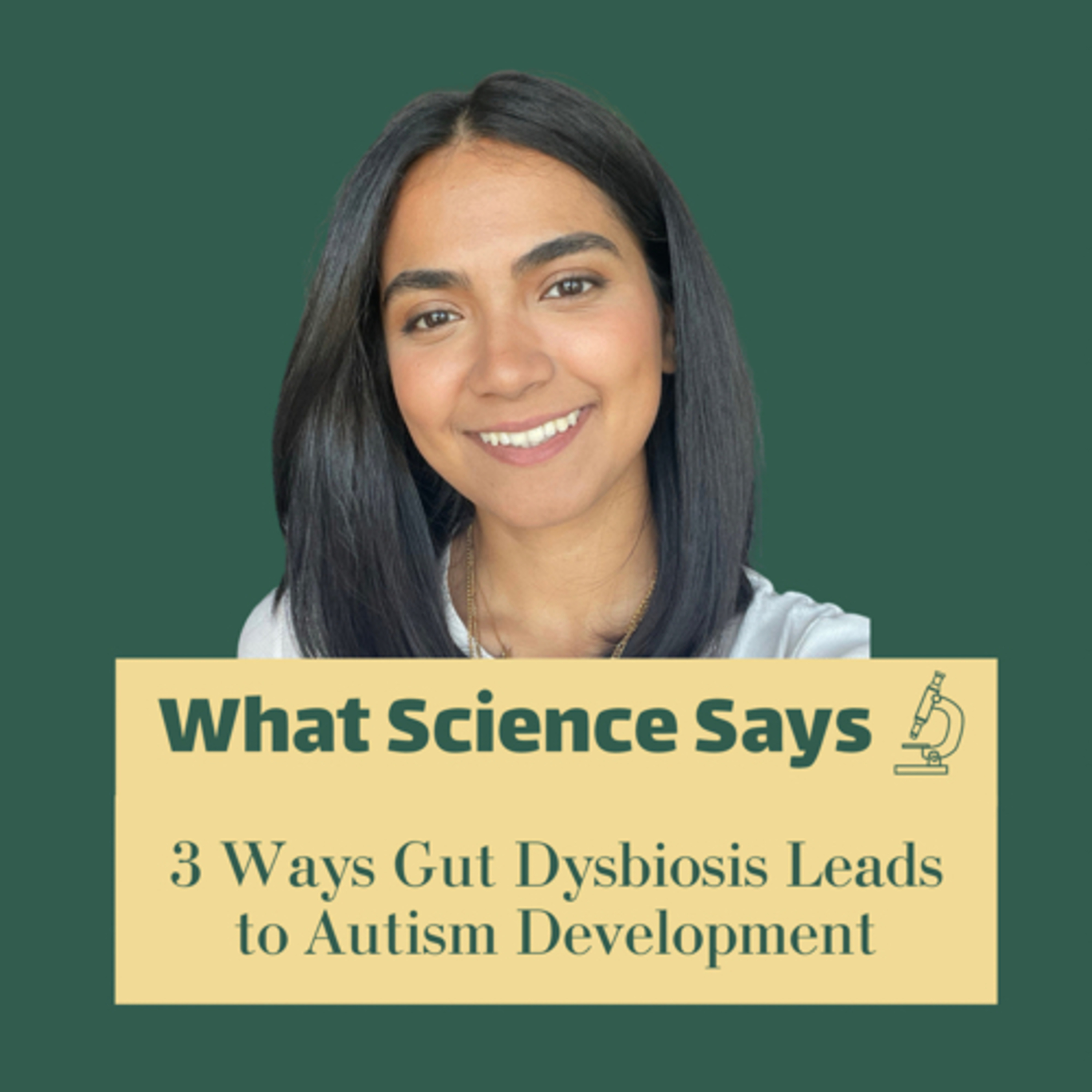 What Science Says19. Three (3) Ways Gut Dysbiosis Leads to Autism DevelopmentHello and welcome to this week’s episode of the What Science Says Podcast. In today’s episode, we talk about how gut dysbiosis can significantly increase the risk of autism, by impairing brain development in critical early years of life.2023-08-2908 min
What Science Says19. Three (3) Ways Gut Dysbiosis Leads to Autism DevelopmentHello and welcome to this week’s episode of the What Science Says Podcast. In today’s episode, we talk about how gut dysbiosis can significantly increase the risk of autism, by impairing brain development in critical early years of life.2023-08-2908 min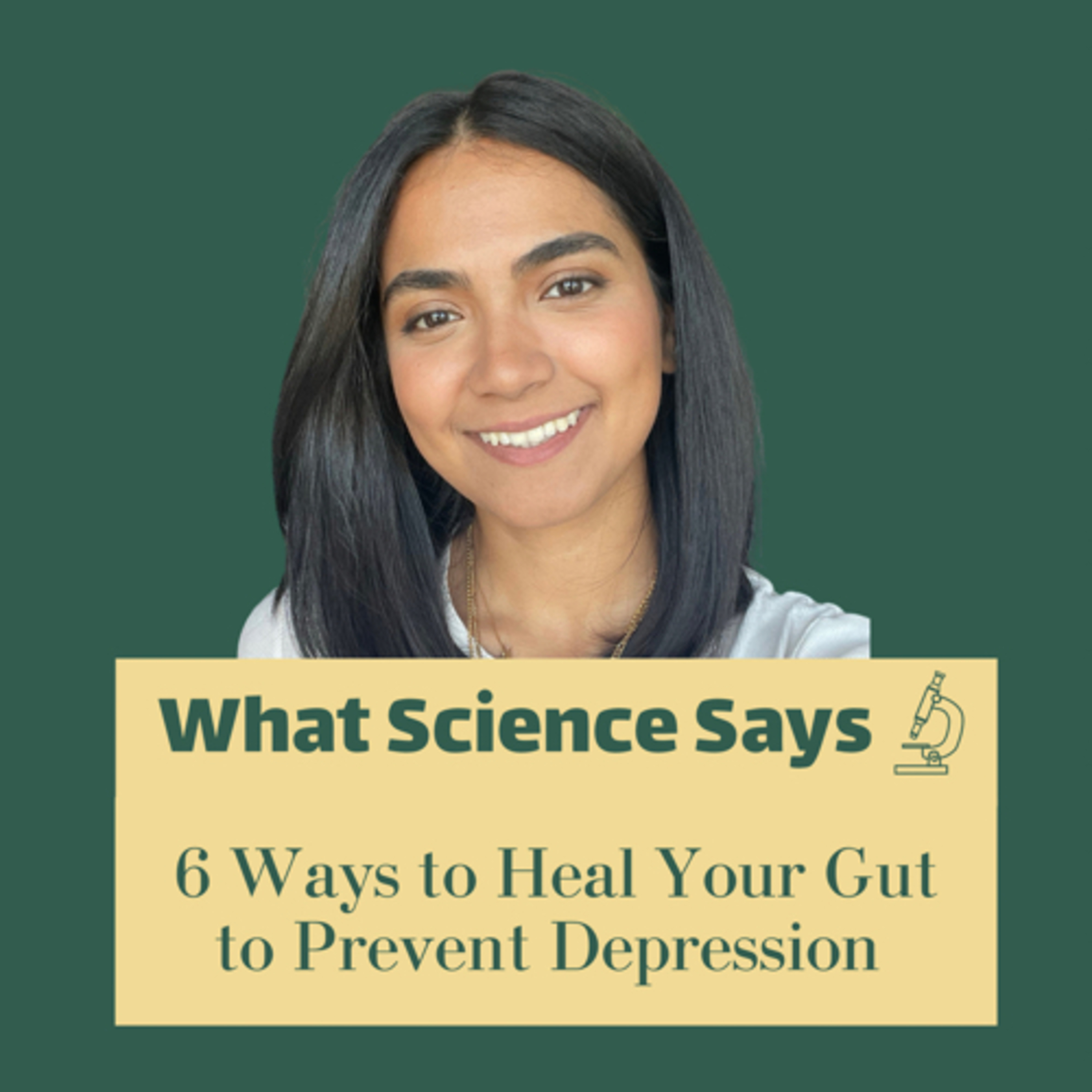 What Science Says18. Six (6) Ways to Heal Your Gut and Prevent Alzheimer’s DiseaseIn today’s episode of What Science Says, we talk about the five ways that gut dysbiosis contributes to Alzheimer’s disease development and progression. We then go into 6 ways to enrich the gut microbiome using tools that are within our control.2023-08-0913 min
What Science Says18. Six (6) Ways to Heal Your Gut and Prevent Alzheimer’s DiseaseIn today’s episode of What Science Says, we talk about the five ways that gut dysbiosis contributes to Alzheimer’s disease development and progression. We then go into 6 ways to enrich the gut microbiome using tools that are within our control.2023-08-0913 min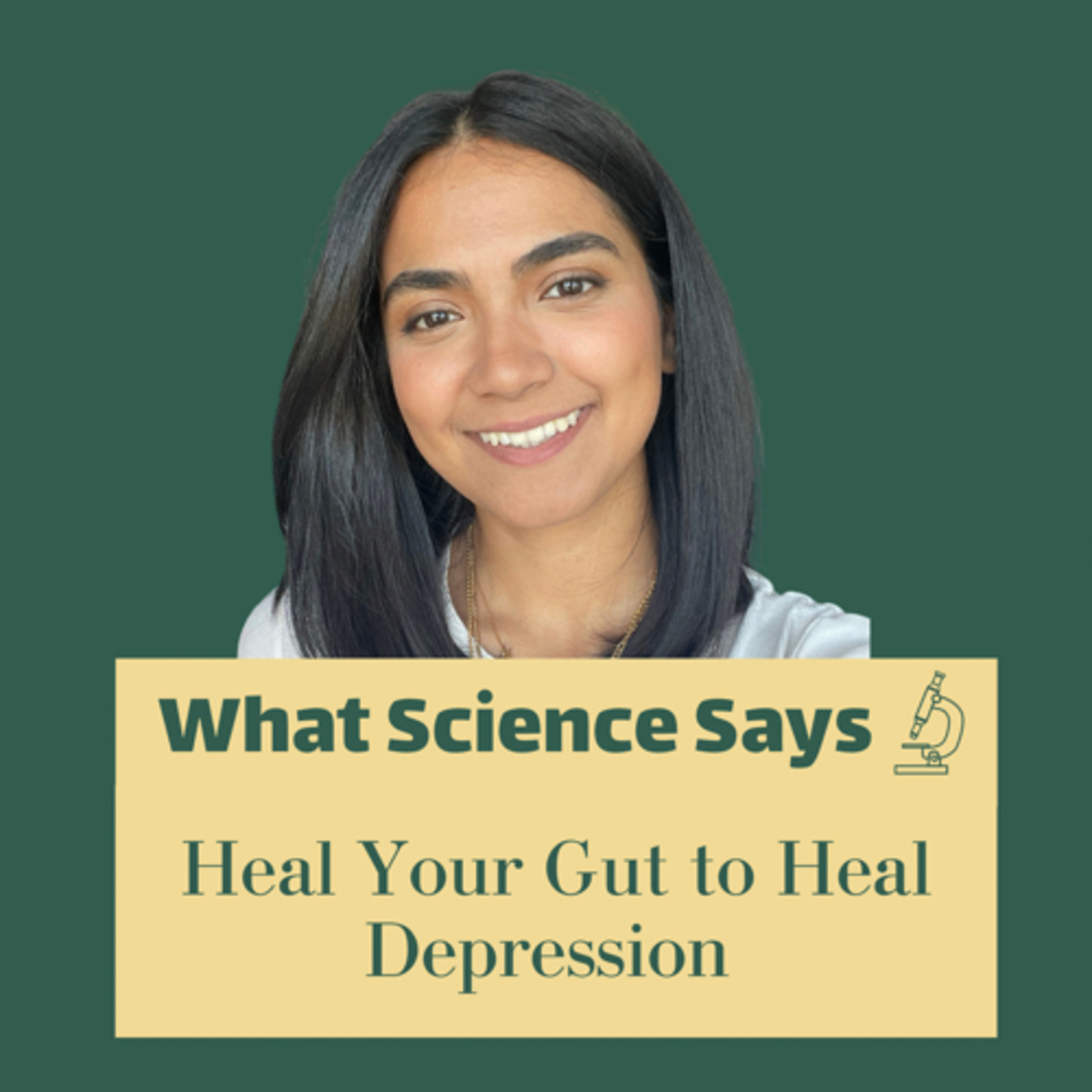 What Science Says17. Heal Your Gut to Heal DepressionIn this episode, we go through all the ways that gut dysbiosis can cause depression. We also outline multiple lines of evidence that show that enriching the gut and maintaining a healthy gut can help alleviate symptoms of depression2023-08-0111 min
What Science Says17. Heal Your Gut to Heal DepressionIn this episode, we go through all the ways that gut dysbiosis can cause depression. We also outline multiple lines of evidence that show that enriching the gut and maintaining a healthy gut can help alleviate symptoms of depression2023-08-0111 min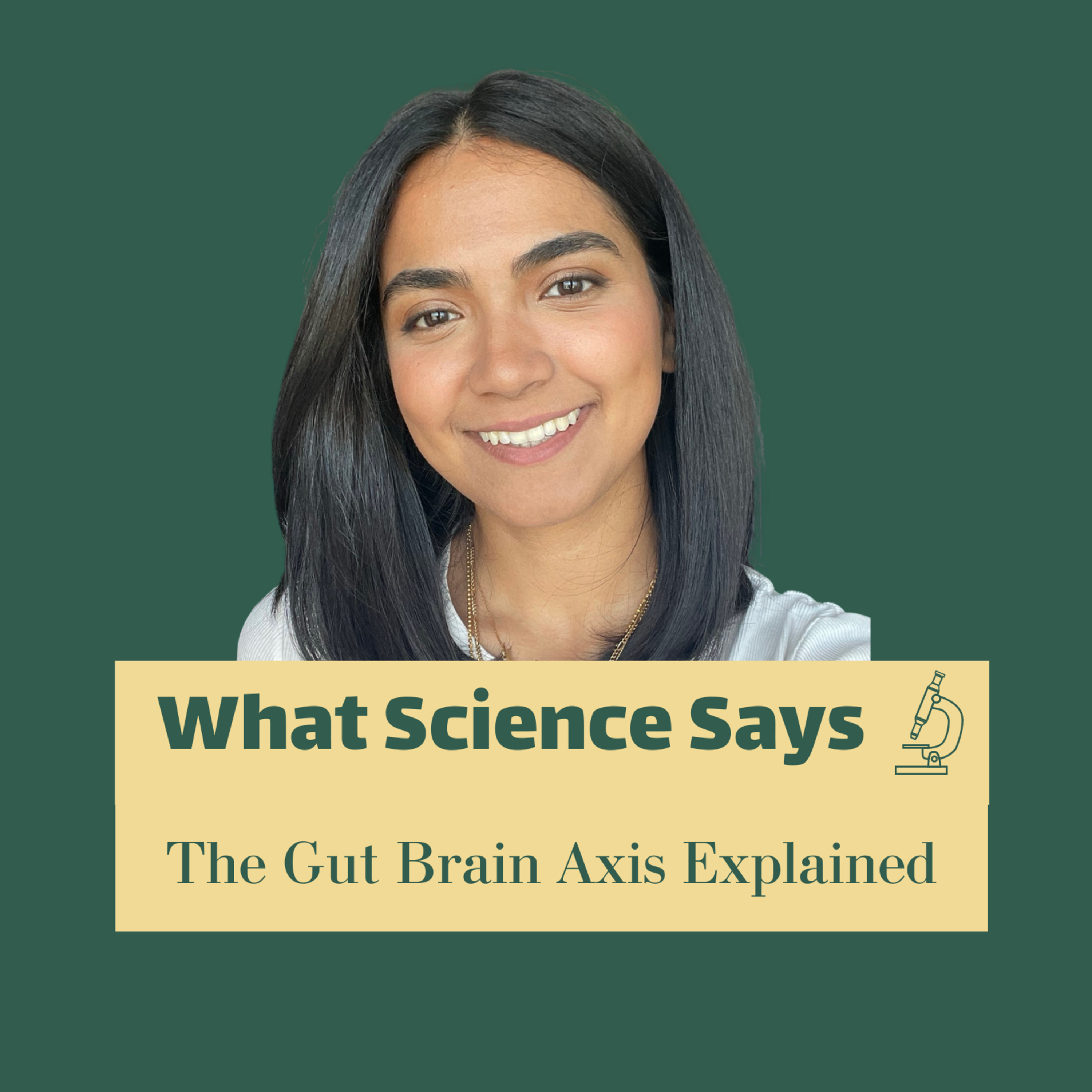 What Science Says16. The Gut-Brain Axis ExplainedIn this episode of the "What Science Says" podcast, we set the groundwork for future episodes, but introducing the gut brain axis, and how the gut microbiota impact and interact with this axis.2023-07-2410 min
What Science Says16. The Gut-Brain Axis ExplainedIn this episode of the "What Science Says" podcast, we set the groundwork for future episodes, but introducing the gut brain axis, and how the gut microbiota impact and interact with this axis.2023-07-2410 min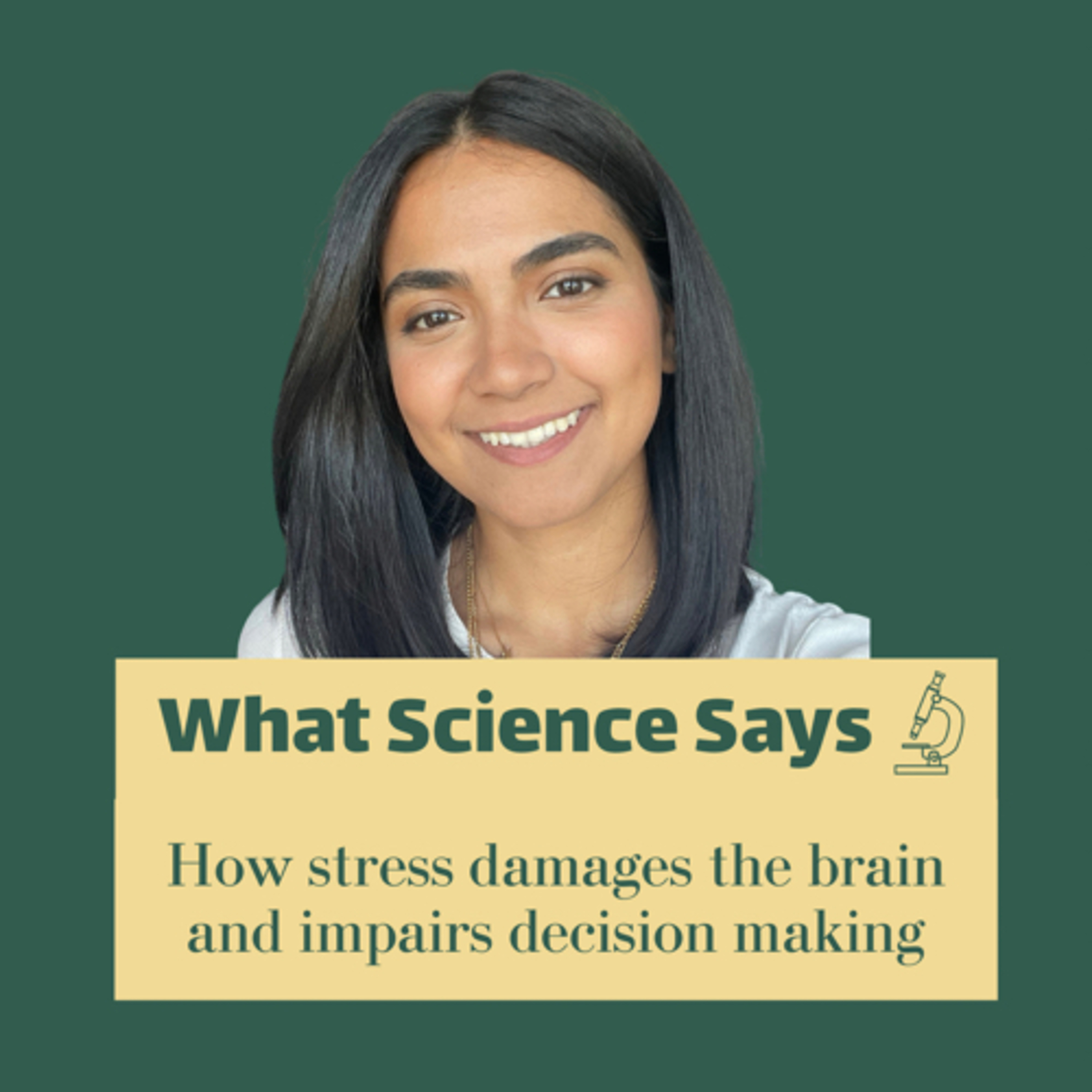 What Science Says15. How stress damages the brain and impairs decision makingWelcome to today’s episode, where we talk about how the brain changes in response to uncontrolled stress. The information from this podcast comes from a beautiful review published by Amy Arnsten in Nature Review Neuroscience n 2009, titled “Stress signalling pathways that impair prefrontal cortex structure and function”2023-06-3008 min
What Science Says15. How stress damages the brain and impairs decision makingWelcome to today’s episode, where we talk about how the brain changes in response to uncontrolled stress. The information from this podcast comes from a beautiful review published by Amy Arnsten in Nature Review Neuroscience n 2009, titled “Stress signalling pathways that impair prefrontal cortex structure and function”2023-06-3008 min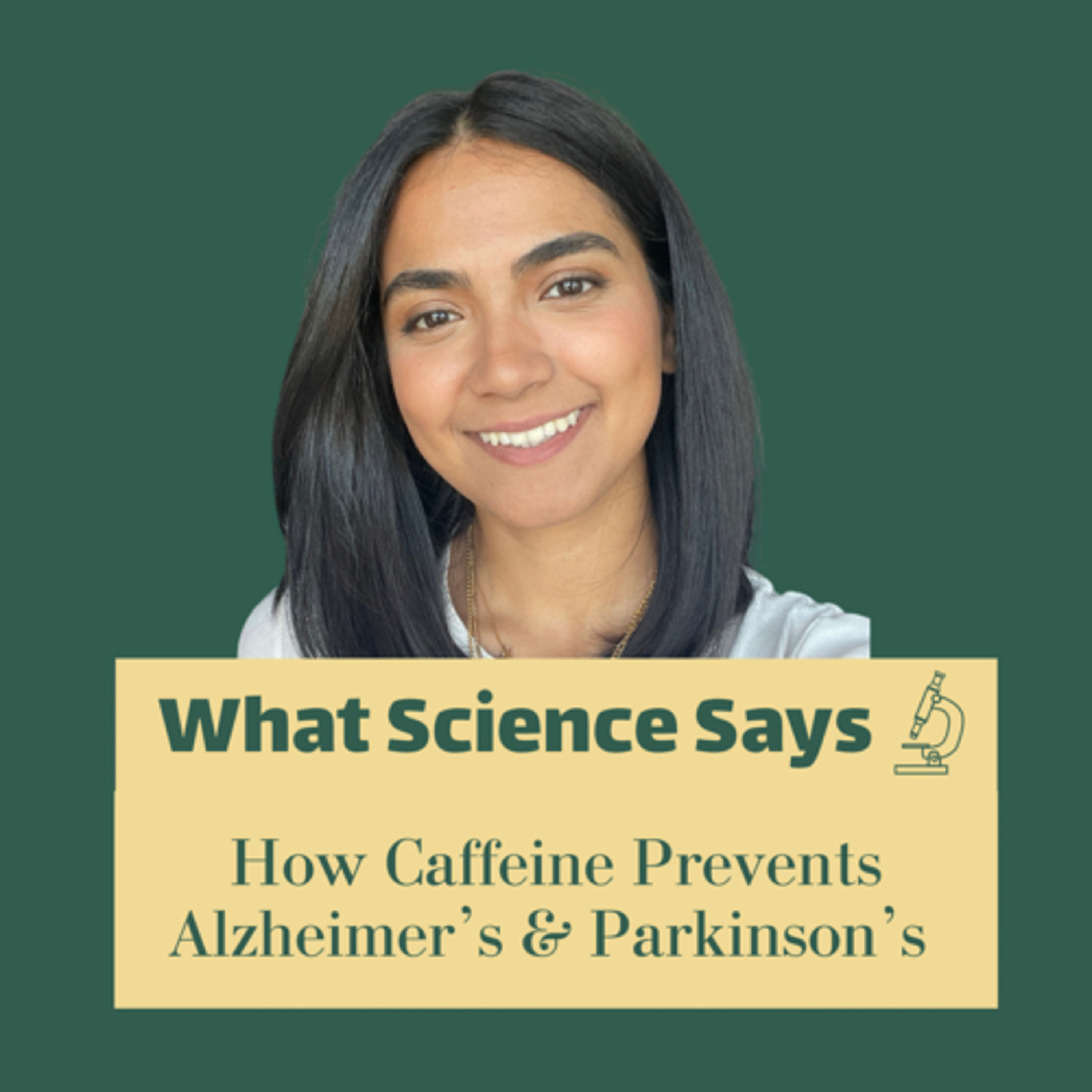 What Science Says14. How Caffeine Prevents Alzheimer’s and Parkinson’s diseaseIn this episode, we explore how caffeine exerts powerful anti oxidant and anti-inflammatory effects, and therefore prevents Alzheimer’s and Parkinson’s disease in both men and women2023-06-2306 min
What Science Says14. How Caffeine Prevents Alzheimer’s and Parkinson’s diseaseIn this episode, we explore how caffeine exerts powerful anti oxidant and anti-inflammatory effects, and therefore prevents Alzheimer’s and Parkinson’s disease in both men and women2023-06-2306 min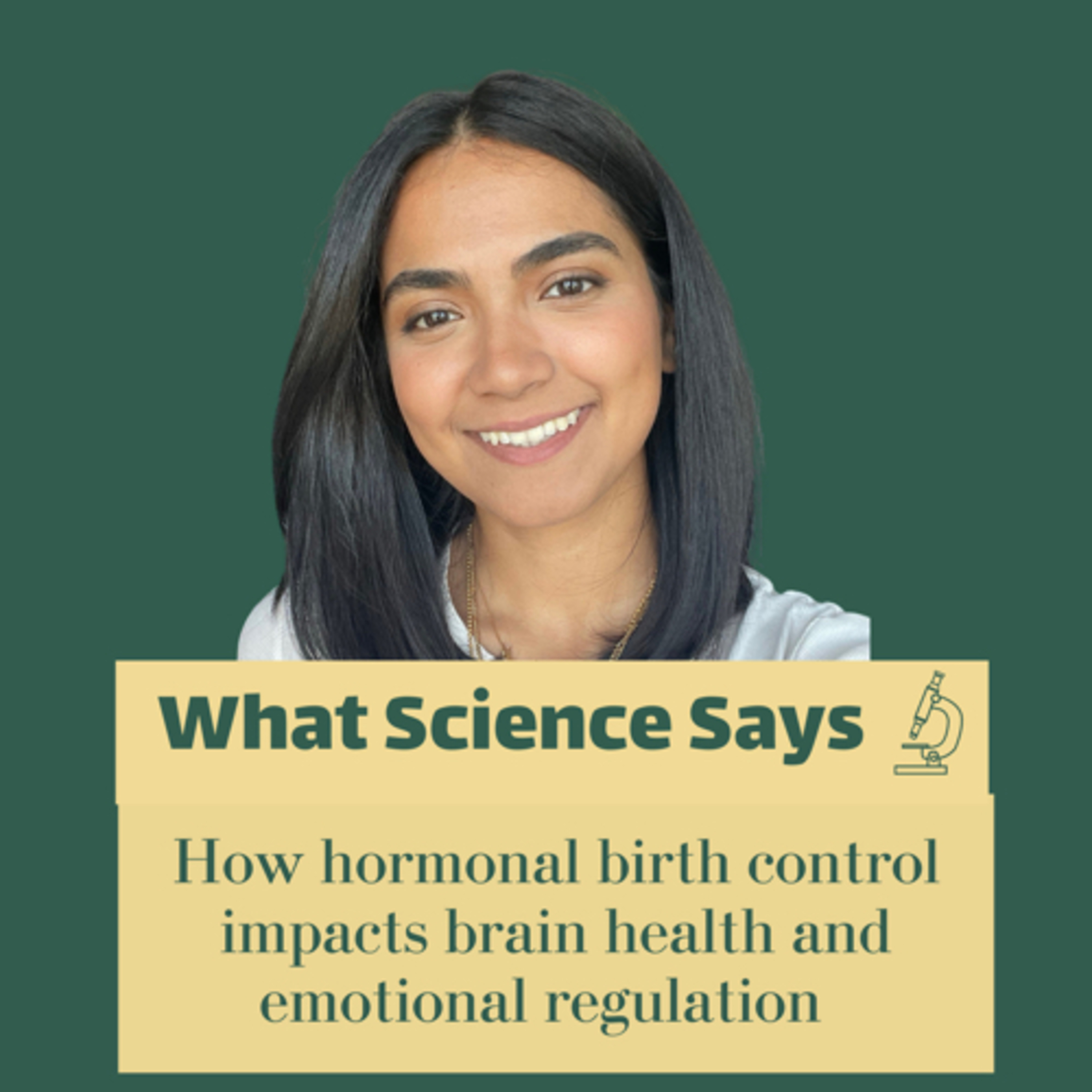 What Science Says13. How hormonal birth control affects brain health and emotional regulationIn this weeks episode of the What Science Says podcast, our host and in-house neuroscientist, Mahshad, talks about how hormonal birth control affects our brain and emotional regulation. We learn the changes that happen in amygdala and how they manifest as changes in response to emotional situations.2023-06-1506 min
What Science Says13. How hormonal birth control affects brain health and emotional regulationIn this weeks episode of the What Science Says podcast, our host and in-house neuroscientist, Mahshad, talks about how hormonal birth control affects our brain and emotional regulation. We learn the changes that happen in amygdala and how they manifest as changes in response to emotional situations.2023-06-1506 min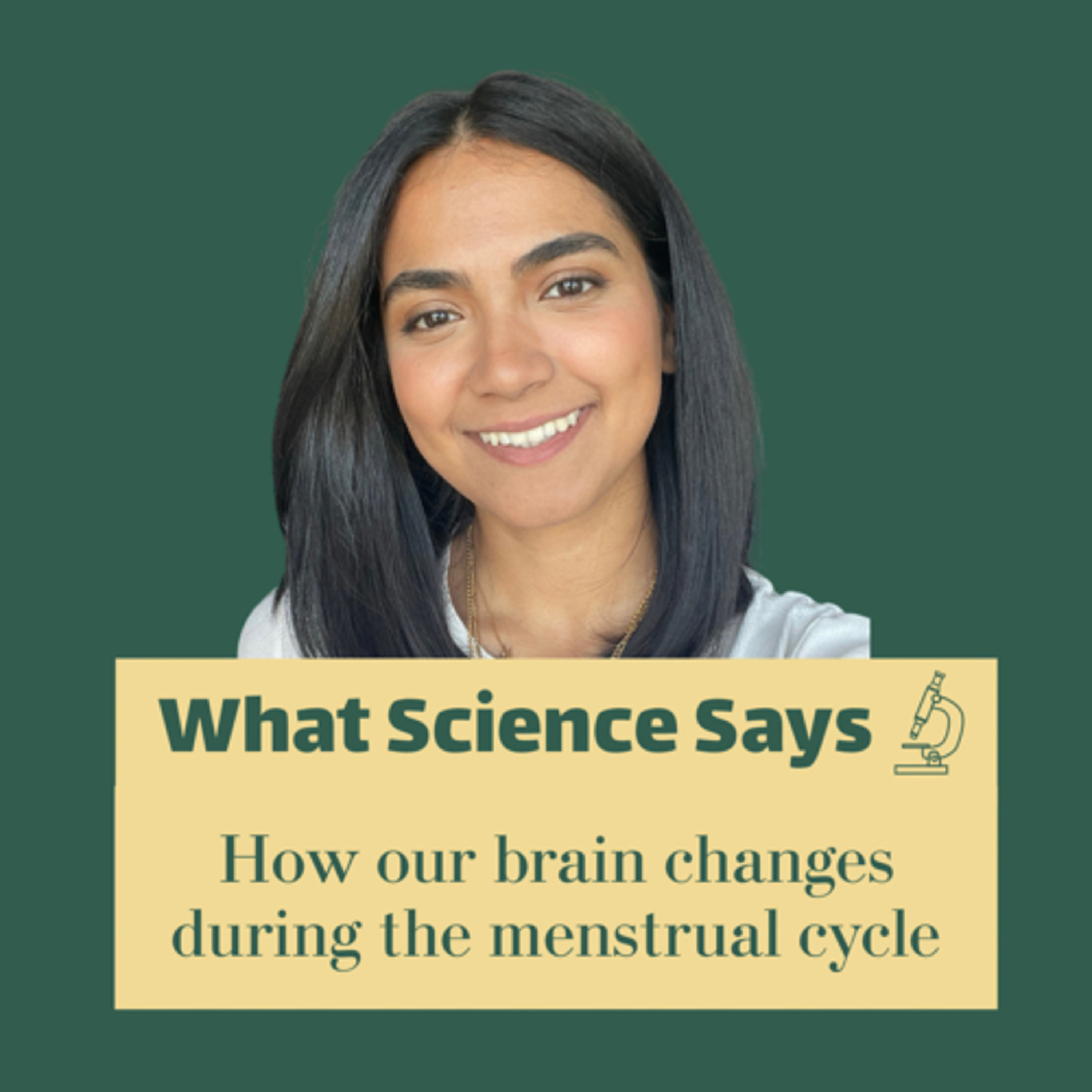 What Science Says12. How Our Brain Changes During the Menstrual CycleIn today’s episode, we learn the changes that our brain undergoes throughout the menstrual cycle, in response to the cyclical hormonal changes.2023-06-0808 min
What Science Says12. How Our Brain Changes During the Menstrual CycleIn today’s episode, we learn the changes that our brain undergoes throughout the menstrual cycle, in response to the cyclical hormonal changes.2023-06-0808 min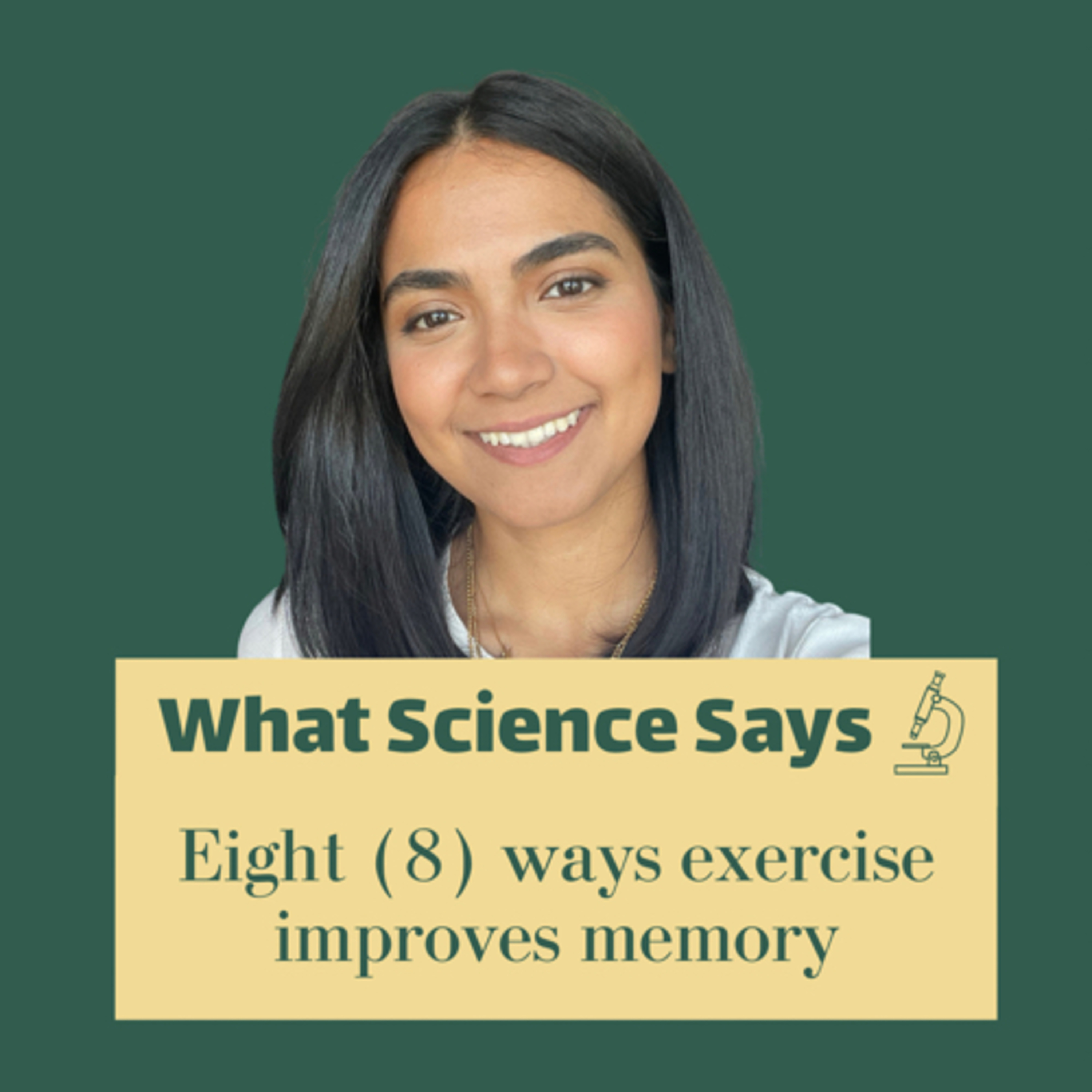 What Science Says11. Eight (8) Ways Exercise Improves MemoryIn today’s What Science Says Podcast episode, Mahshad, our host and neuroscientist, talks about 8 key ways that exercise improves memory. We talk about brain oxygen levels, increases in brain volume, insulin sensitivity, neurogenesis and much more.2023-05-2508 min
What Science Says11. Eight (8) Ways Exercise Improves MemoryIn today’s What Science Says Podcast episode, Mahshad, our host and neuroscientist, talks about 8 key ways that exercise improves memory. We talk about brain oxygen levels, increases in brain volume, insulin sensitivity, neurogenesis and much more.2023-05-2508 min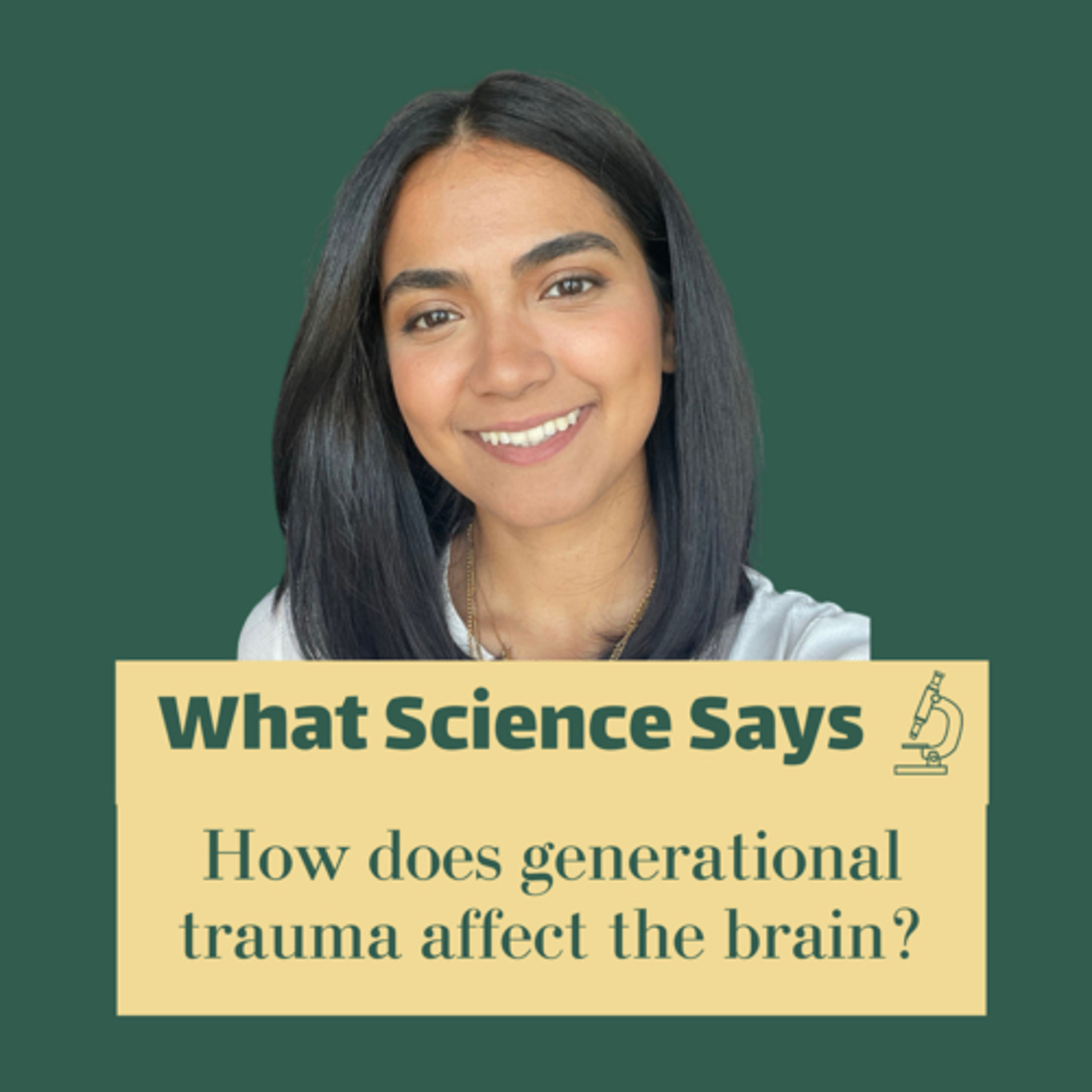 What Science Says10. How does generational trauma affect brain health?In today’s episode of the What Science Says podcast, our host and in-house neuroscientist Mahshad, tackles the heavy subject of generational trauma. We learn how trauma is passed down through generations, how it affects the brain and our stress machinery, and what its outcomes are for its victims.2023-05-1807 min
What Science Says10. How does generational trauma affect brain health?In today’s episode of the What Science Says podcast, our host and in-house neuroscientist Mahshad, tackles the heavy subject of generational trauma. We learn how trauma is passed down through generations, how it affects the brain and our stress machinery, and what its outcomes are for its victims.2023-05-1807 min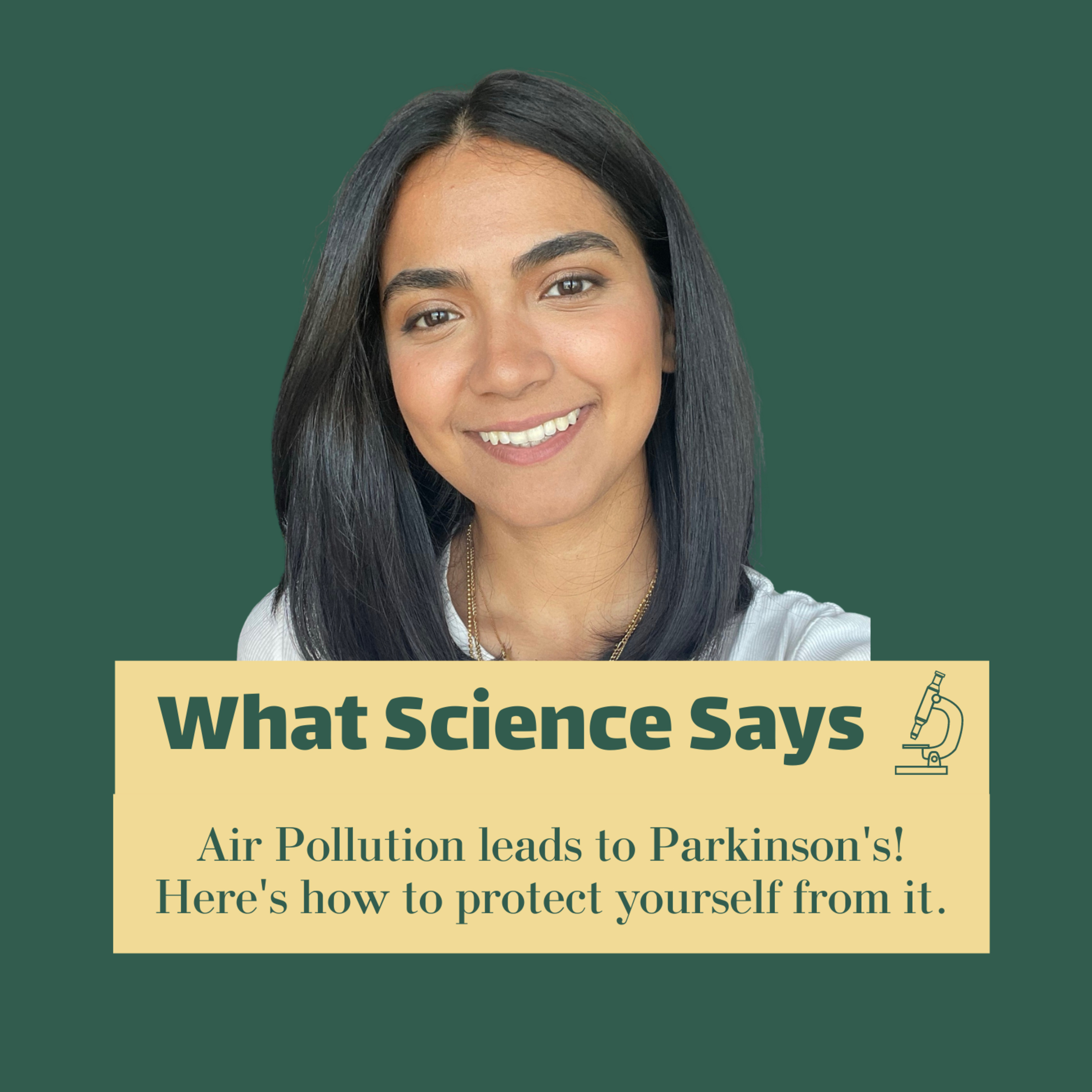 What Science Says9. Air pollution increases risk of Parkinson's! Here's how to protect yourself from it.In this episode of the what science says podcast, our host and neuroscientist, Mahshad, explores how air pollution damages the brain and increases the risk of developing Parkinson's, and the damage can start from a very young age and accumulate over time. But the good news is, we also learn about very effective tools we can add to our life tool kit to protect our brain from this damage!2023-05-1106 min
What Science Says9. Air pollution increases risk of Parkinson's! Here's how to protect yourself from it.In this episode of the what science says podcast, our host and neuroscientist, Mahshad, explores how air pollution damages the brain and increases the risk of developing Parkinson's, and the damage can start from a very young age and accumulate over time. But the good news is, we also learn about very effective tools we can add to our life tool kit to protect our brain from this damage!2023-05-1106 min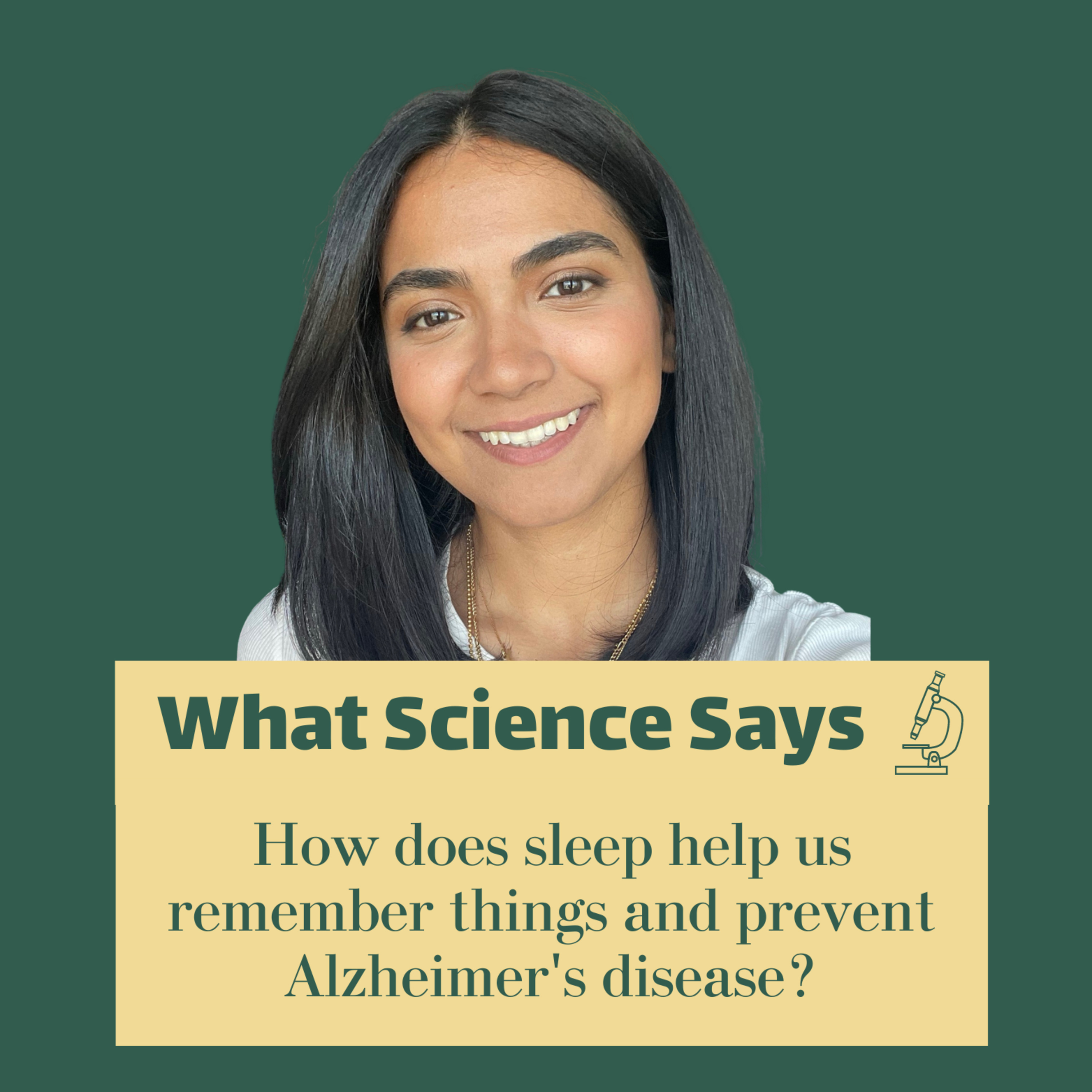 What Science Says8. How does sleep help us remember things and prevent Alzheimer's disease?In this episode of the What Science Says podcast, our host and neuroscientist Mahshad, explores the important impact good sleep has on memory, brain waste clearance and prevention of Alzheimer's disease.2023-05-0406 min
What Science Says8. How does sleep help us remember things and prevent Alzheimer's disease?In this episode of the What Science Says podcast, our host and neuroscientist Mahshad, explores the important impact good sleep has on memory, brain waste clearance and prevention of Alzheimer's disease.2023-05-0406 min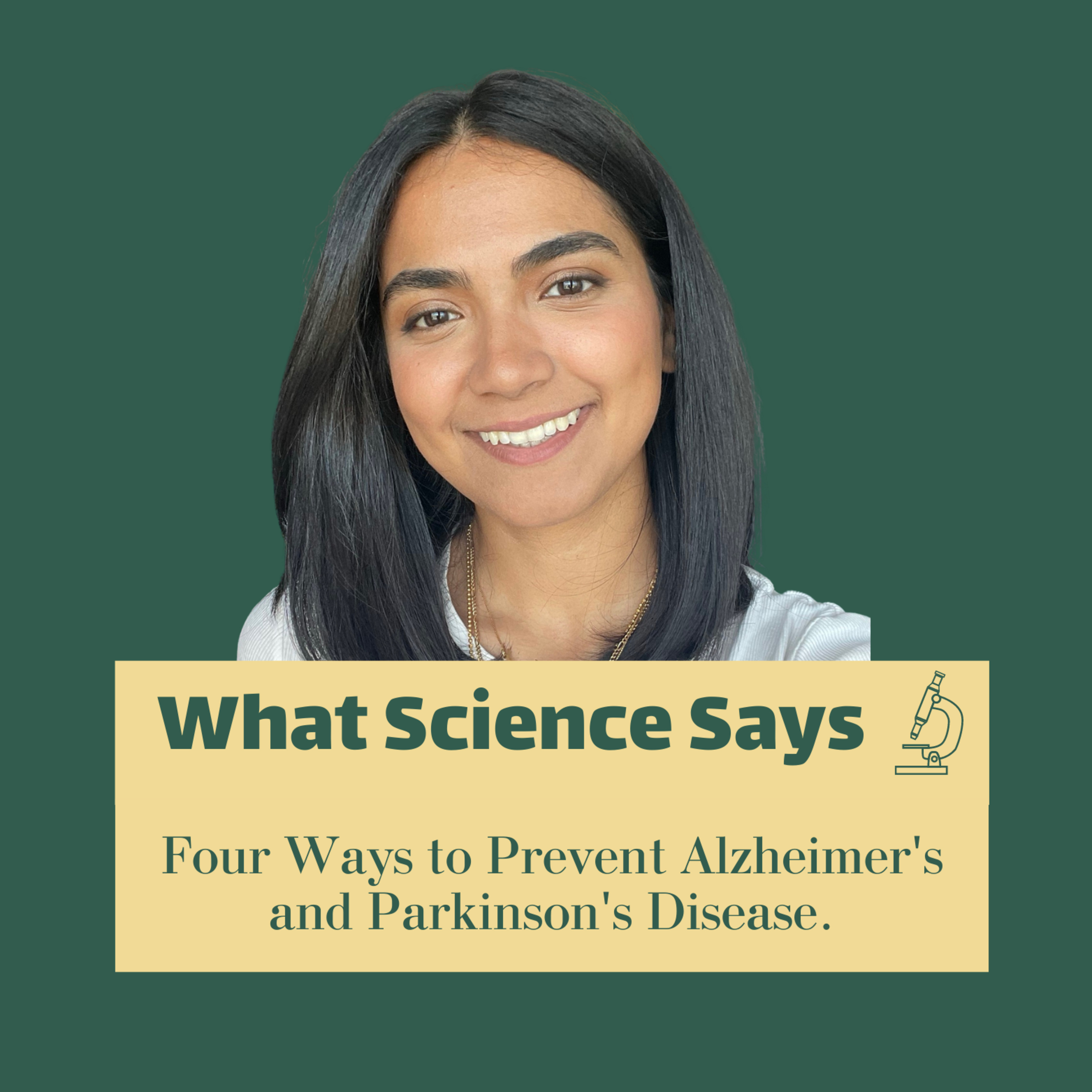 What Science Says7. Four Ways to Prevent Alzheimer's and Parkinson's DiseaseIn this episode of the What Science Says Podcast, our host and neuroscientist, Mahshad, talks about the start of Alzheimer's Disease and Parkinson's disease vs. the start of the symptoms of these diseases. We also learn about factors that increase the risk of these diseases, and what we can do to prevent them.2023-04-2707 min
What Science Says7. Four Ways to Prevent Alzheimer's and Parkinson's DiseaseIn this episode of the What Science Says Podcast, our host and neuroscientist, Mahshad, talks about the start of Alzheimer's Disease and Parkinson's disease vs. the start of the symptoms of these diseases. We also learn about factors that increase the risk of these diseases, and what we can do to prevent them.2023-04-2707 min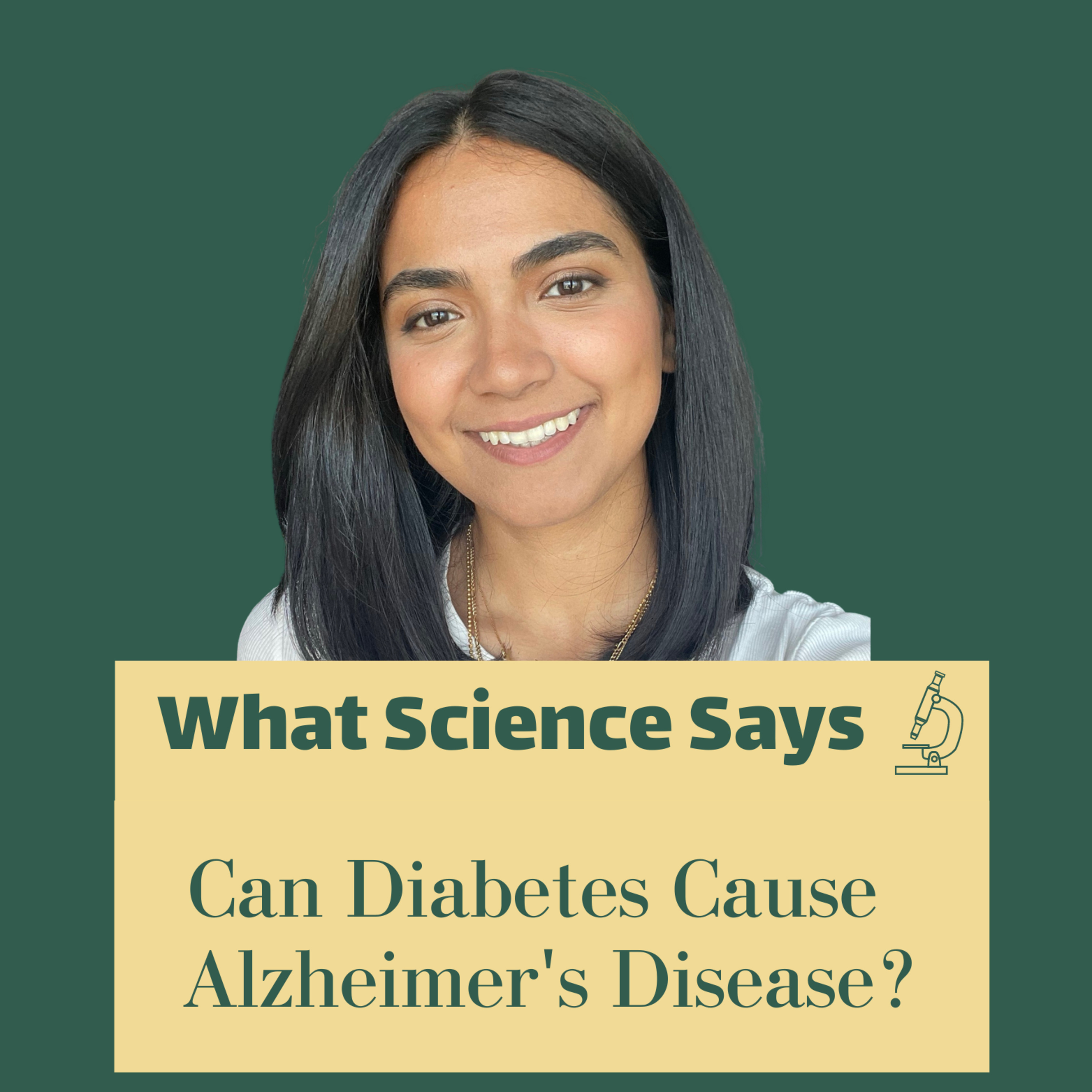 What Science Says6. Can Diabetes Cause Alzheimer's Disease?In this week's episode of the What Science Says podcast, our host Mahshad talks about four key mechanisms that link Alzheimer's disease and diabetes. With both diseases on the rise, we explore whether diabetes causes Alzheimer's disease.
References:
Prasad et al. Diabetes Mellitus and Blood-Brain Barrier Dysfunction: An Overview. J Pharmacovigil. 2014 Jun; 2(2): 125.
Mullins et al. Insulin Resistance as a Link between Amyloid-Beta and Tau Pathologies in Alzheimer’s Disease. Front Aging Neurosci. 2017; 9: 118.
Michailidis et al. Antidiabetic Drugs in the Treatment of Alzheimer’s Disease. Int J Mol Sci. 2022 May; 23(9): 4641.2023-04-2007 min
What Science Says6. Can Diabetes Cause Alzheimer's Disease?In this week's episode of the What Science Says podcast, our host Mahshad talks about four key mechanisms that link Alzheimer's disease and diabetes. With both diseases on the rise, we explore whether diabetes causes Alzheimer's disease.
References:
Prasad et al. Diabetes Mellitus and Blood-Brain Barrier Dysfunction: An Overview. J Pharmacovigil. 2014 Jun; 2(2): 125.
Mullins et al. Insulin Resistance as a Link between Amyloid-Beta and Tau Pathologies in Alzheimer’s Disease. Front Aging Neurosci. 2017; 9: 118.
Michailidis et al. Antidiabetic Drugs in the Treatment of Alzheimer’s Disease. Int J Mol Sci. 2022 May; 23(9): 4641.2023-04-2007 min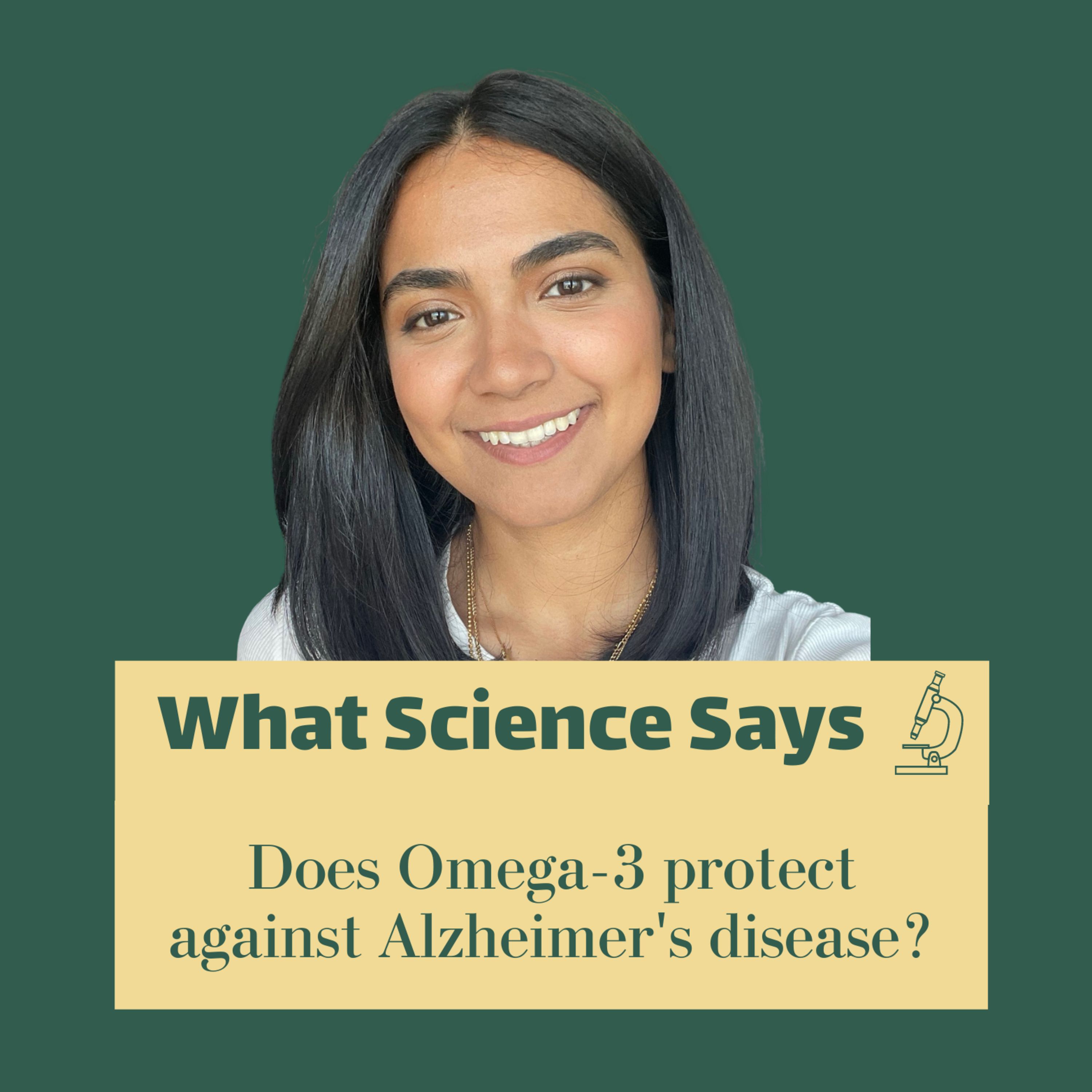 What Science Says5. Can Omega-3 Protect Against Alzheimer's Disease?In this episode of the WhatScienceSays podcast, we learn about the protective effects of omega-3 against Alzheimer's disease. We learn about the dosage and the specific type of omega-3 fatty acid that is most beneficial. This episode is hosted by Mahshad, a neuroscientist and PhD candidate at the University of Toronto and The Hospital for Sick Children.
References:
1. Chiu CC, Su KP, Cheng TC, Liu HC, Chang CJ, Dewey ME, Stewart R, Huang SY. The effects of omega-3 fatty acids monotherapy in Alzheimer's disease and mild cognitive impairment: a preliminary randomized double-blind placebo-controlled study. Prog Neuropsychopharmacol Biol Psychiatry. 2008 Jan 1;32(6):1538-44.
2...2023-04-1305 min
What Science Says5. Can Omega-3 Protect Against Alzheimer's Disease?In this episode of the WhatScienceSays podcast, we learn about the protective effects of omega-3 against Alzheimer's disease. We learn about the dosage and the specific type of omega-3 fatty acid that is most beneficial. This episode is hosted by Mahshad, a neuroscientist and PhD candidate at the University of Toronto and The Hospital for Sick Children.
References:
1. Chiu CC, Su KP, Cheng TC, Liu HC, Chang CJ, Dewey ME, Stewart R, Huang SY. The effects of omega-3 fatty acids monotherapy in Alzheimer's disease and mild cognitive impairment: a preliminary randomized double-blind placebo-controlled study. Prog Neuropsychopharmacol Biol Psychiatry. 2008 Jan 1;32(6):1538-44.
2...2023-04-1305 min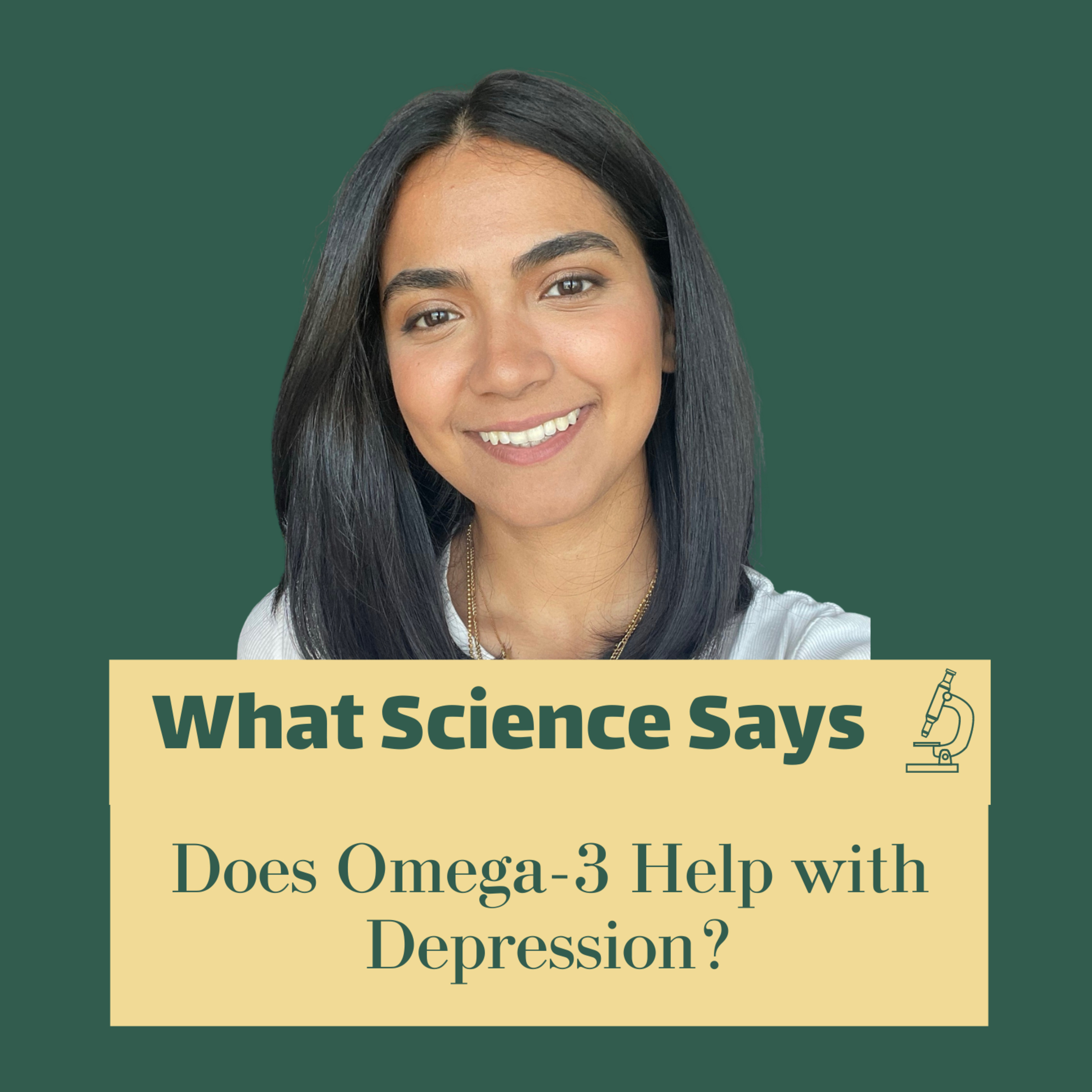 What Science Says4. Does Omega-3 Help with Depression?In this week's episode, we see what science says about omega-3 and depression. Does omega-3 help manage symptoms of depression? What kind of omega-3 are we talking about? What is the optimal dose? Listen to find out the answer to these questions and more! Mahshad, our host, is a neuroscientist and PhD candidate that will answer these questions based on data from peer-reviewed articles from reputable sources.
References:
Liao et al., Efficacy of omega-3 PUFAs in depression: A meta-analysis, Translational Psychiatry (2019)9:190
Nemets at l., Addition of Omega-3 Fatty Acid to Maintenance Medication Treatment for Recurrent Unipolar Depressive Disorder, Am J...2023-04-0603 min
What Science Says4. Does Omega-3 Help with Depression?In this week's episode, we see what science says about omega-3 and depression. Does omega-3 help manage symptoms of depression? What kind of omega-3 are we talking about? What is the optimal dose? Listen to find out the answer to these questions and more! Mahshad, our host, is a neuroscientist and PhD candidate that will answer these questions based on data from peer-reviewed articles from reputable sources.
References:
Liao et al., Efficacy of omega-3 PUFAs in depression: A meta-analysis, Translational Psychiatry (2019)9:190
Nemets at l., Addition of Omega-3 Fatty Acid to Maintenance Medication Treatment for Recurrent Unipolar Depressive Disorder, Am J...2023-04-0603 min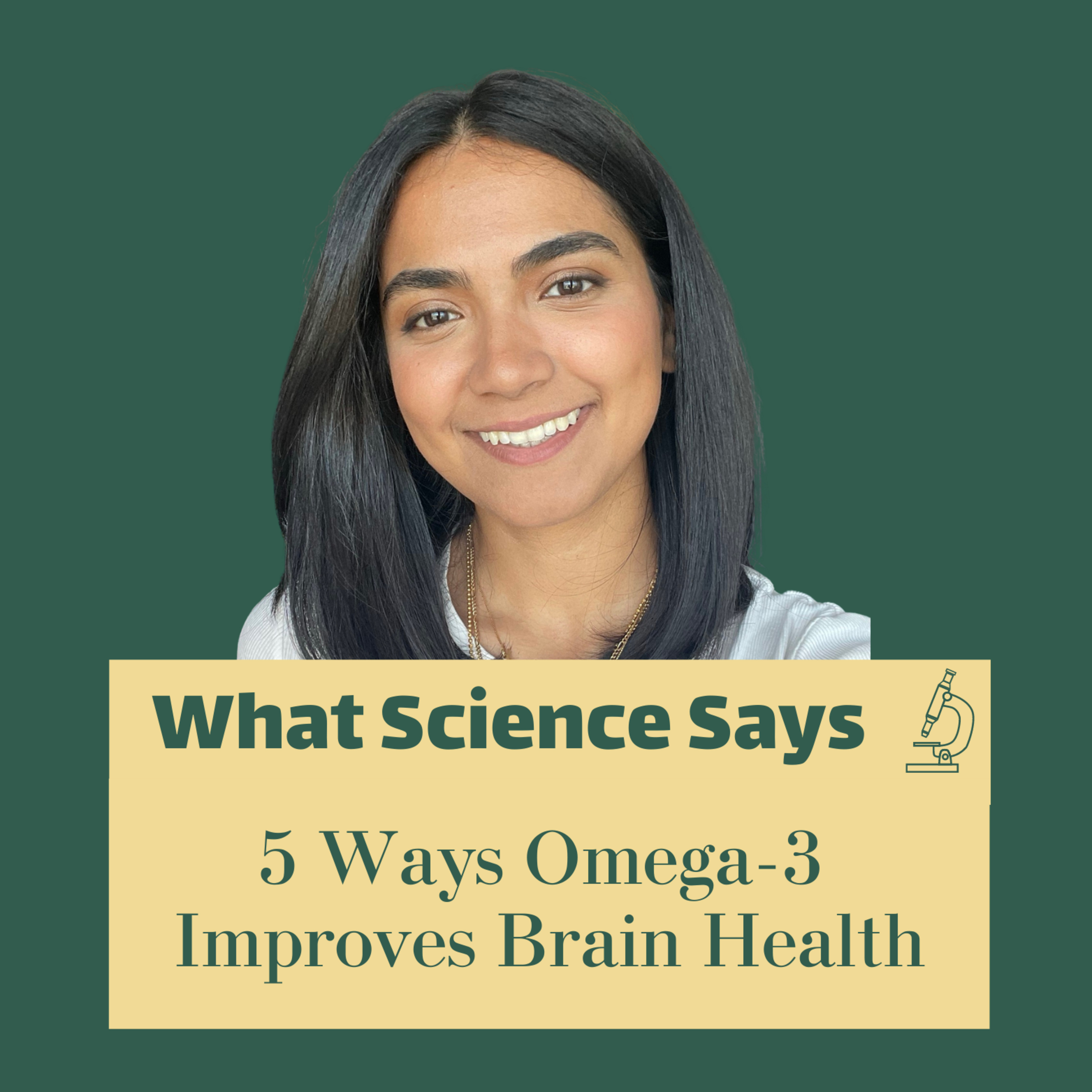 What Science Says3. Five Ways Omega 3 Improves Brain HealthIn this episode of the What Science Says Podcast, we learn about five ways that omega-3 improves and maintains brain health.
Omega-3 maintains neuronal membrane integrity:
Logan et al., Neurobehavioural aspects of omega-3 fatty acids: possible mechanisms and therapeutic value in major depression disorder. Alt Med Rev. 2003. 8(4):410-425.
Omega 3 reduces inflammation:
Silva et al. Mediterranean Diet: Lipids, Inflammation, and Malaria Infection. Int J Mol Sci. 2020: 21(4489).
Omega-3 supports synaptic plasticity:
Crupi et al. n-3 fatty acids: role in neurogenesis and neuroplasticity. Curr Med Chem. 2013;20(24):2953-63
Omega-3 improves cerebral blood flow:
Schwarz et al. Effects of Omega-3 Fatty Acids on Resting Cerebral P...2023-03-2806 min
What Science Says3. Five Ways Omega 3 Improves Brain HealthIn this episode of the What Science Says Podcast, we learn about five ways that omega-3 improves and maintains brain health.
Omega-3 maintains neuronal membrane integrity:
Logan et al., Neurobehavioural aspects of omega-3 fatty acids: possible mechanisms and therapeutic value in major depression disorder. Alt Med Rev. 2003. 8(4):410-425.
Omega 3 reduces inflammation:
Silva et al. Mediterranean Diet: Lipids, Inflammation, and Malaria Infection. Int J Mol Sci. 2020: 21(4489).
Omega-3 supports synaptic plasticity:
Crupi et al. n-3 fatty acids: role in neurogenesis and neuroplasticity. Curr Med Chem. 2013;20(24):2953-63
Omega-3 improves cerebral blood flow:
Schwarz et al. Effects of Omega-3 Fatty Acids on Resting Cerebral P...2023-03-2806 min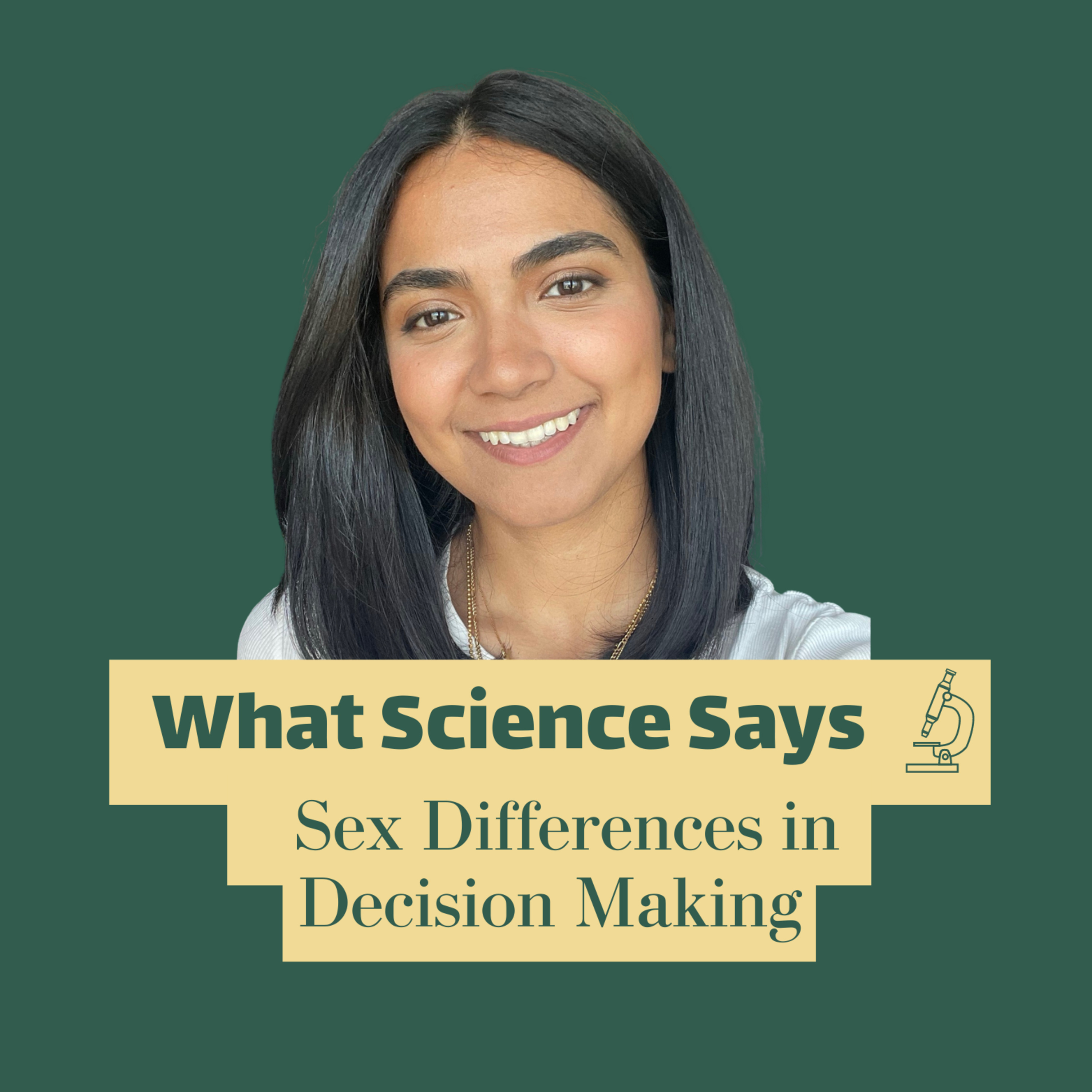 What Science Says2. Sex Differences in Decision MakingAre there sex differences in decision making? Is one sex or gender better at making decisions? Is one sex or gender better at paying attention and remembering things? Let's see what science says in this episode of the WhatScienceSays podcast, with host Mahshad, a neuroscientist and PhD candidate from the University of Toronto.
References:
Grissom and Reyes. "Let’s call the whole thing off: evaluating gender and sex differences in executive function". Neuropsychopharmacology (2019) 44:1–11.
Cox et al. "A neural substrate of sex-dependent modulation of motivation." Nat Neurosci (2023)2023-03-2006 min
What Science Says2. Sex Differences in Decision MakingAre there sex differences in decision making? Is one sex or gender better at making decisions? Is one sex or gender better at paying attention and remembering things? Let's see what science says in this episode of the WhatScienceSays podcast, with host Mahshad, a neuroscientist and PhD candidate from the University of Toronto.
References:
Grissom and Reyes. "Let’s call the whole thing off: evaluating gender and sex differences in executive function". Neuropsychopharmacology (2019) 44:1–11.
Cox et al. "A neural substrate of sex-dependent modulation of motivation." Nat Neurosci (2023)2023-03-2006 min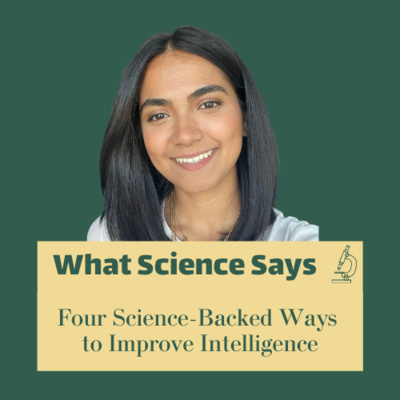 What Science Says1. Four Science Backed Ways to Improve IntelligenceHello and welcome to the first episode of the What Science Says podcast. Your host Mahshad, a neuroscientist and PhD candidate at the university of Toronto, discusses how to improve fluid intelligence with science-backed lifestyle choices.2023-03-1308 min
What Science Says1. Four Science Backed Ways to Improve IntelligenceHello and welcome to the first episode of the What Science Says podcast. Your host Mahshad, a neuroscientist and PhD candidate at the university of Toronto, discusses how to improve fluid intelligence with science-backed lifestyle choices.2023-03-1308 min